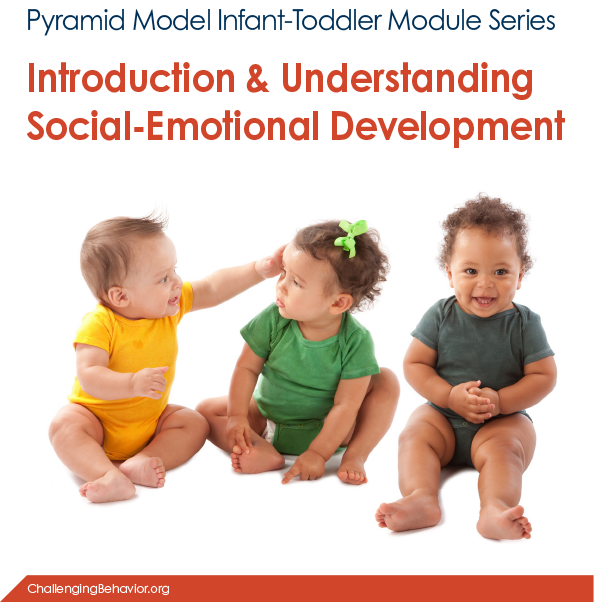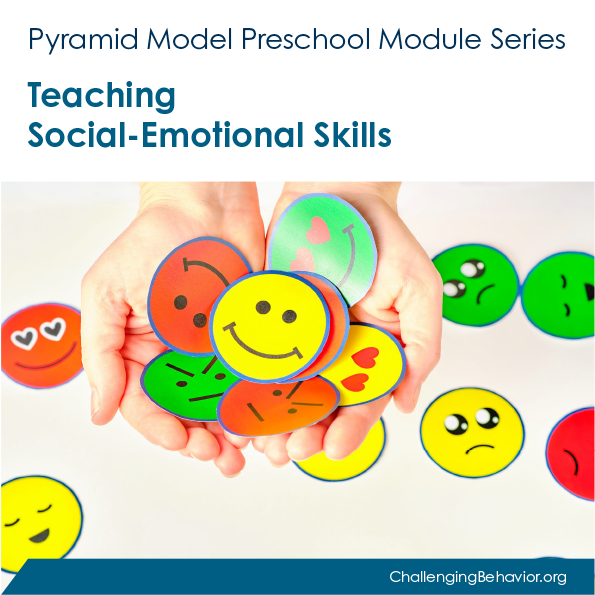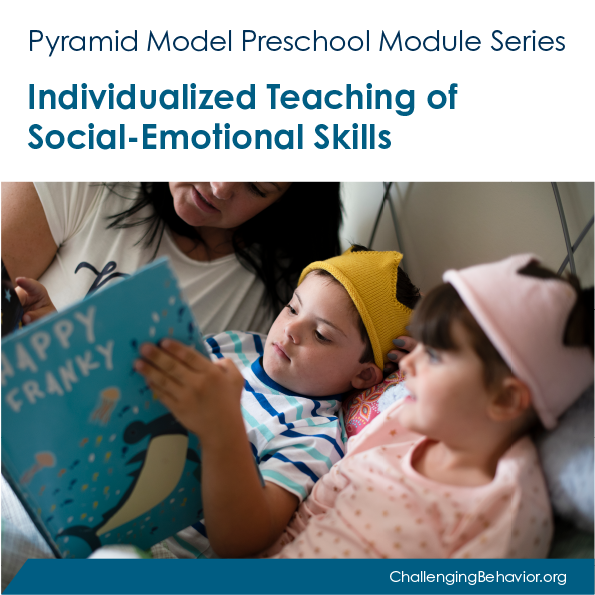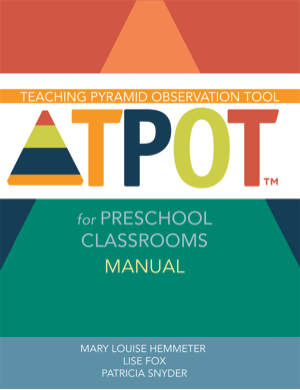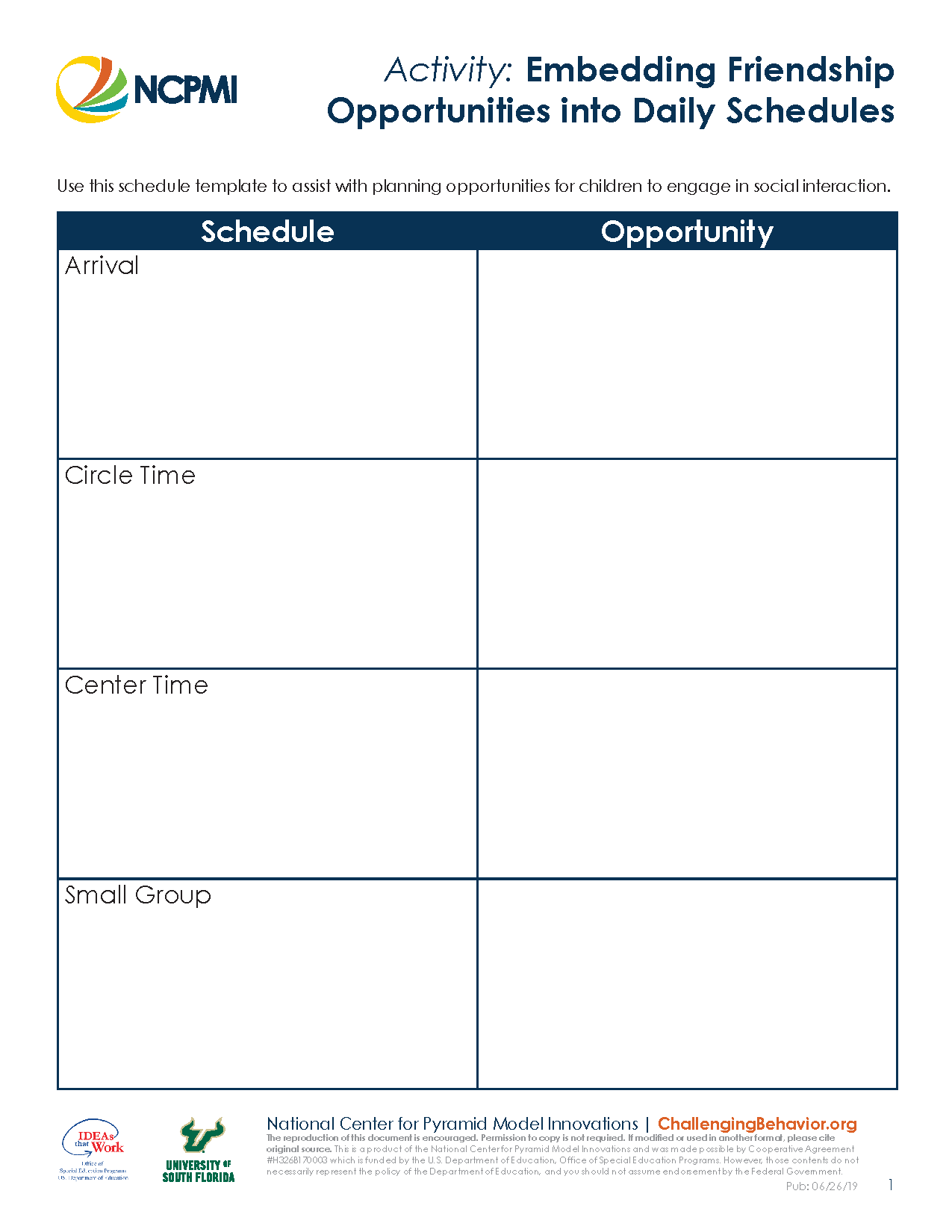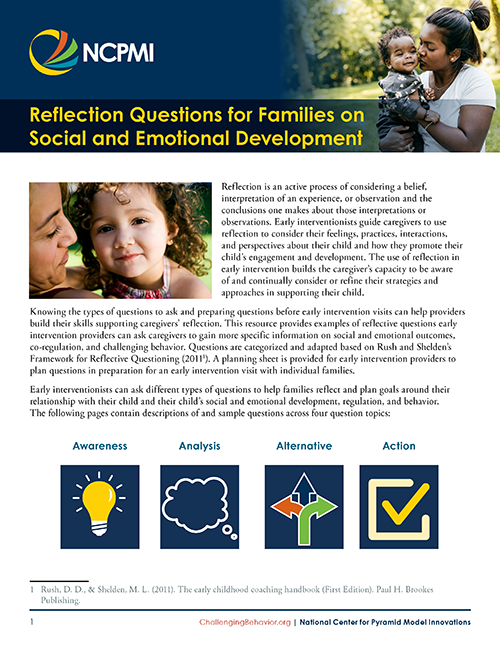Practice Based Coaching (PBC)
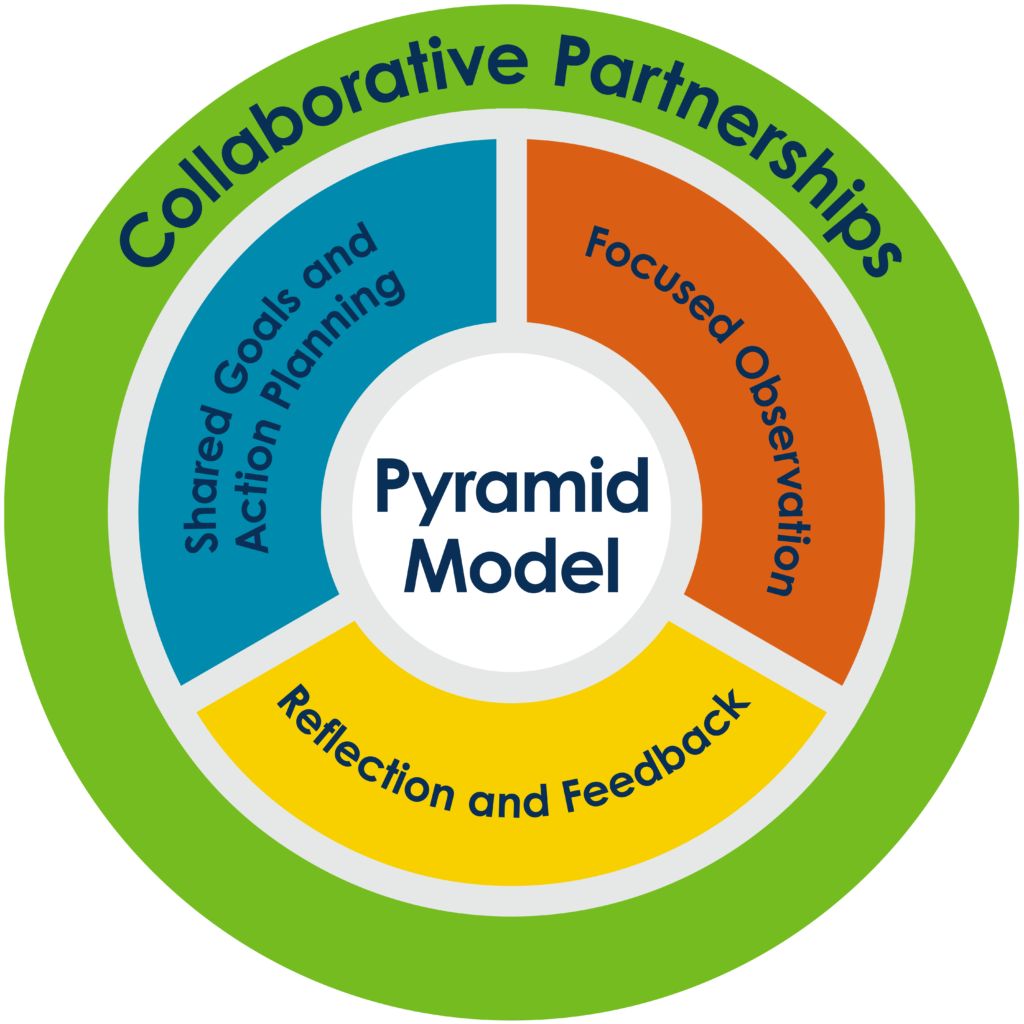
Practice-based coaching is a cyclical process for guiding practitioners’ use of evidence-based practices for promoting positive child outcomes. Practice-based coaching involves the following components:
- collaborative partnerships
- shared goals and action planning
- focused observation
- reflection and feedback
On this site, we will provide resources for using PBC to promote practitioners’ use of the Pyramid Model Practices. While many of our existing products are designed to support practitioners who work in center based programs, the model is also relevant for supporting home visitors in their work with families and other caregivers.
Featured Resources
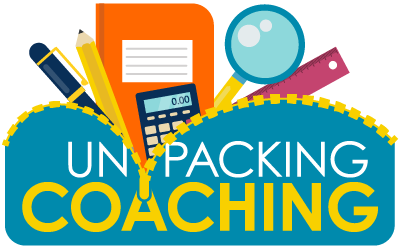
Unpacking Coaching Webinar Series
This series covers topics related to practice-based coaching. Upcoming webinar schedule and registration on the Training Webinar page.
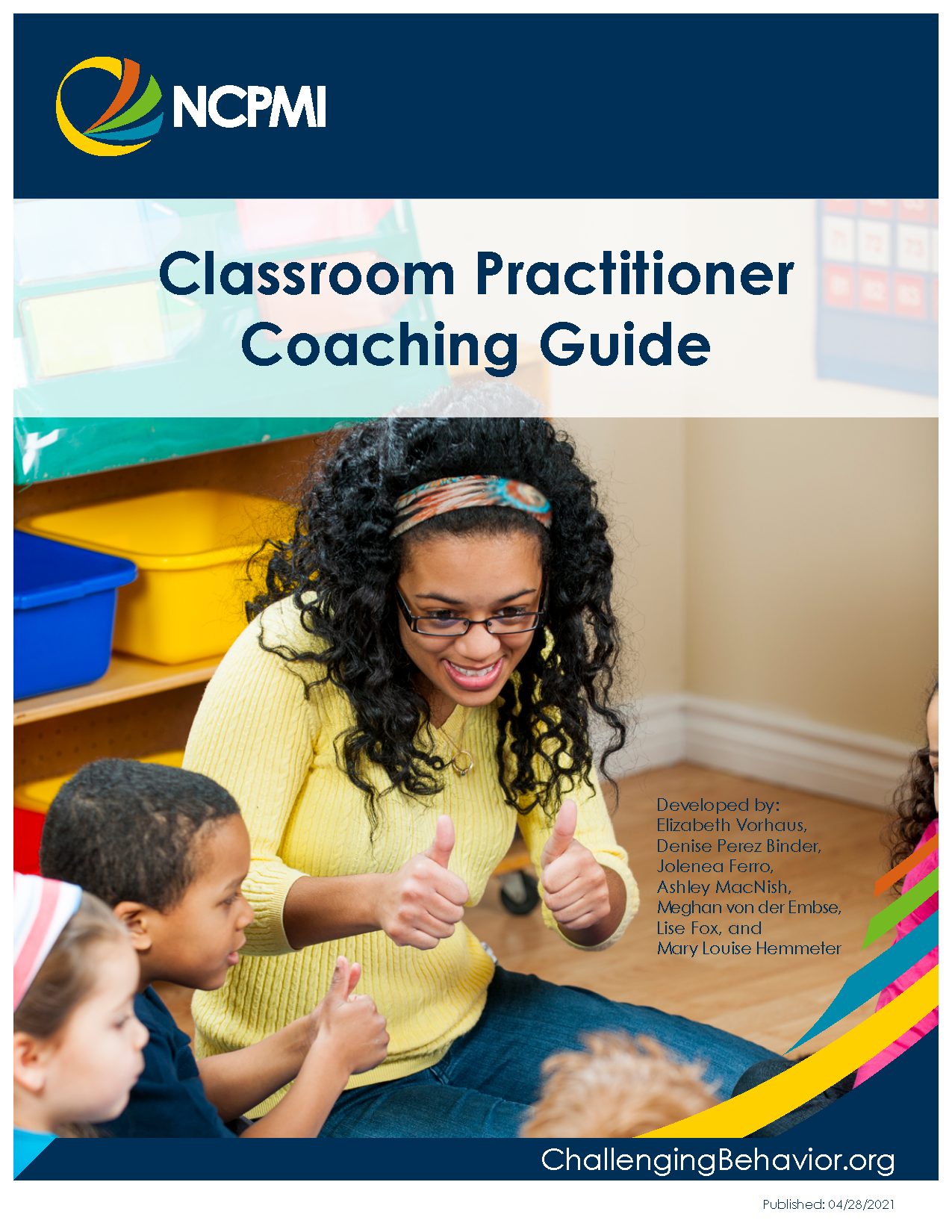
Classroom Practitioner Coaching Guide
This manual provides a valuable resource that is full of tips and guidance for coaches as they implement practitioner coaching with classroom teachers.
Related Resources
Guided Action Planning
Share goals and action planning is one of the components of the Practice-Based Coaching (PBC)cycle. This process begins with a practitioner and coach identifying the practitioners’ strengths and needs related to a set of effective teaching practices that are the focus of coaching. Once the practitioner and coach have identified a practice, together they create a goal and action plan which serves as the road map for practice implementation (Snyder et. al., 2022). Therefore, making the action plan is an essential tool for implementing PBC.
Guided action plans are customizable templates that give coaches and practitioners ideas as they collaboratively write goals for Pyramid Model implementation. This resource guides coaches and practitioners in developing an action plan. It includes the desired child outcomes, plans for implementation, and the steps needed to implement the Pyramid Model practice. These templates are only guides, and we encourage users to individualize the plans to meet the diverse needs of practitioners, children, and their families.
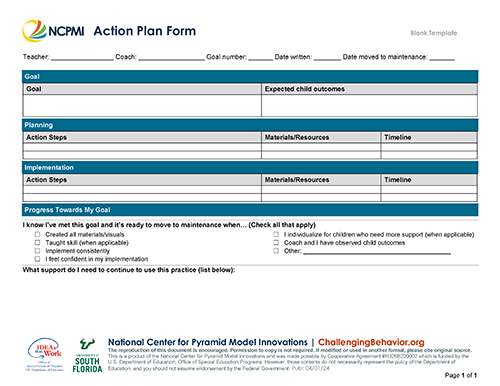
This Guided Action Plan Package includes action plan templates in a ready-to-use format. The Guided Action Plans At-A-Glance document provides an overview of the intended use of these templates, how this resource situates itself within the PBC model, answers frequently asked questions, and provides a menu of the templates that are available. There are 15 customizable action plans templates and 5 sample action plans that focus on a variety of Pyramid Model practices. A blank action plan template and an individualization planning form.
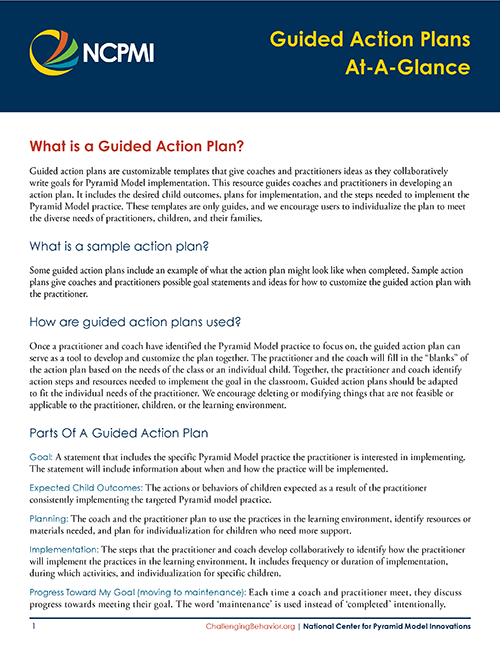
Provides an overview of the intended use of these templates, how this resource situates itself within the PBC model, answers frequently asked questions, and provides a menu of the templates that are available.

This is a short introduction to the Guided Action Plan (GAP) resource bundle, which describes what a GAP is, how it might be used in practice-based coaching, and the resources included in this bundle. Included are considerations and tips for using the materials.
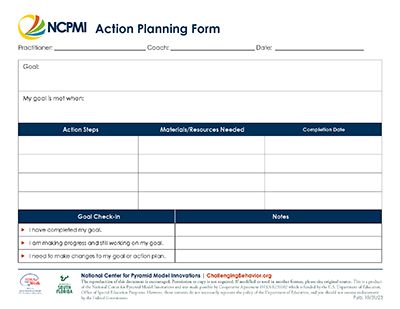
Coaches and teachers can use this form during shared goals and action planning to document goals and action plans.
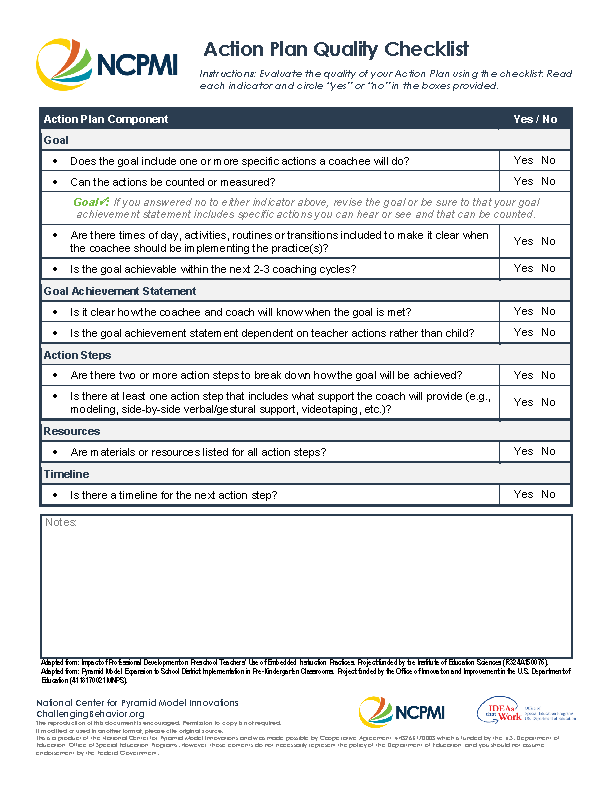
This checklist can be used by practitioner coaches and practitioners as a tool to write a high quality action plan.
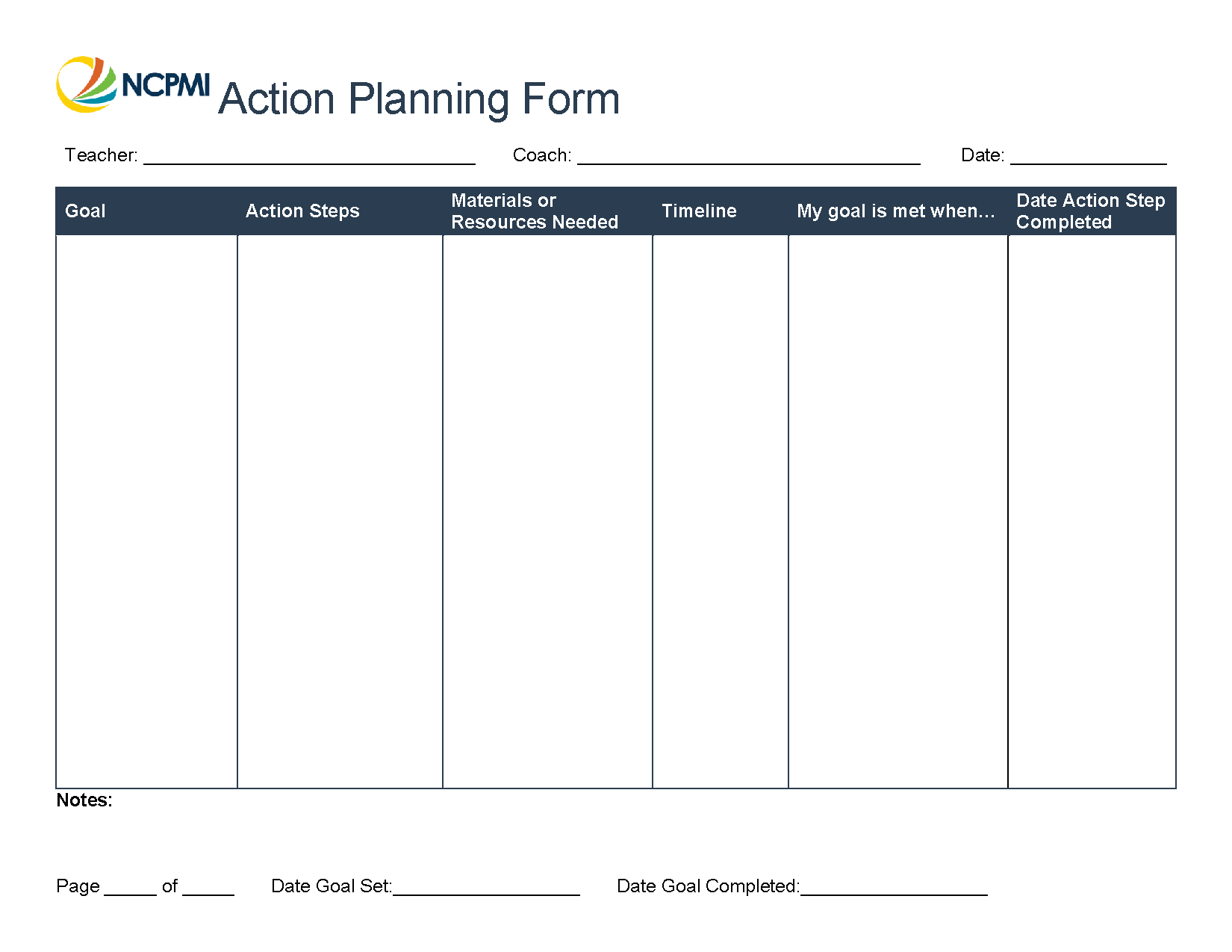
Are you coaching teachers to implement behavior support plans? You will probably want to start with an action plan. This sheet provides a template to use with a teacher for action planning.

Are you coaching teachers to implement behavior support plans? You will probably want to start with an action plan. This sheet provides a template to use with a teacher for action planning.
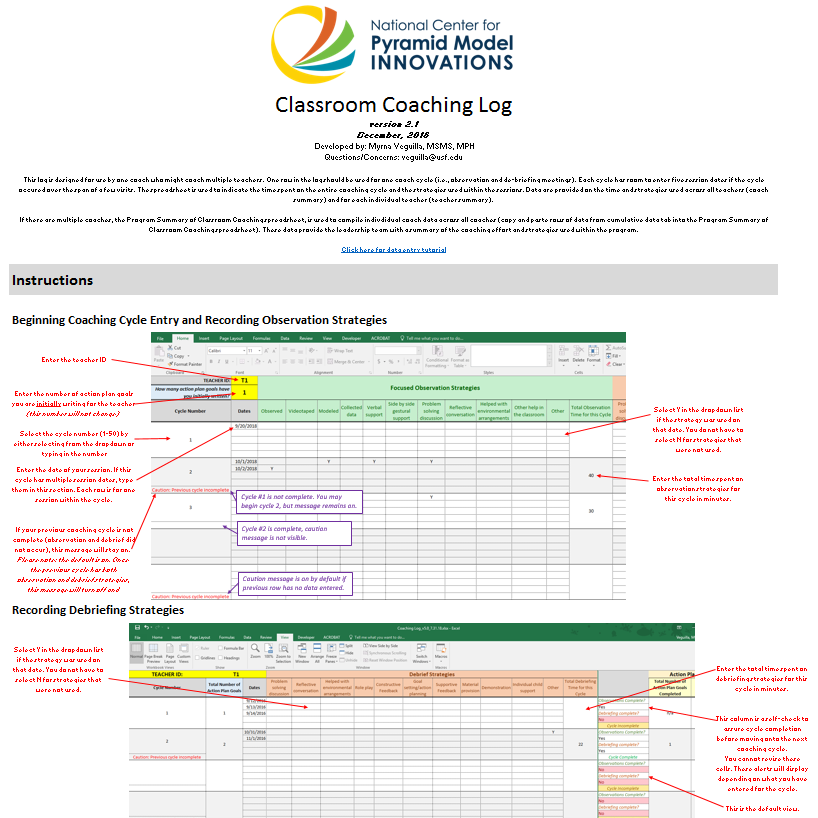
This Individual Coaching Log is designed for use by one coach who might coach multiple teachers. The spreadsheet is used to indicate the time spent on the entire coaching cycle and the strategies used within the sessions. Data are provided on the time and strategies used across all teachers (coach summary) and for an individual teacher (teacher summary).
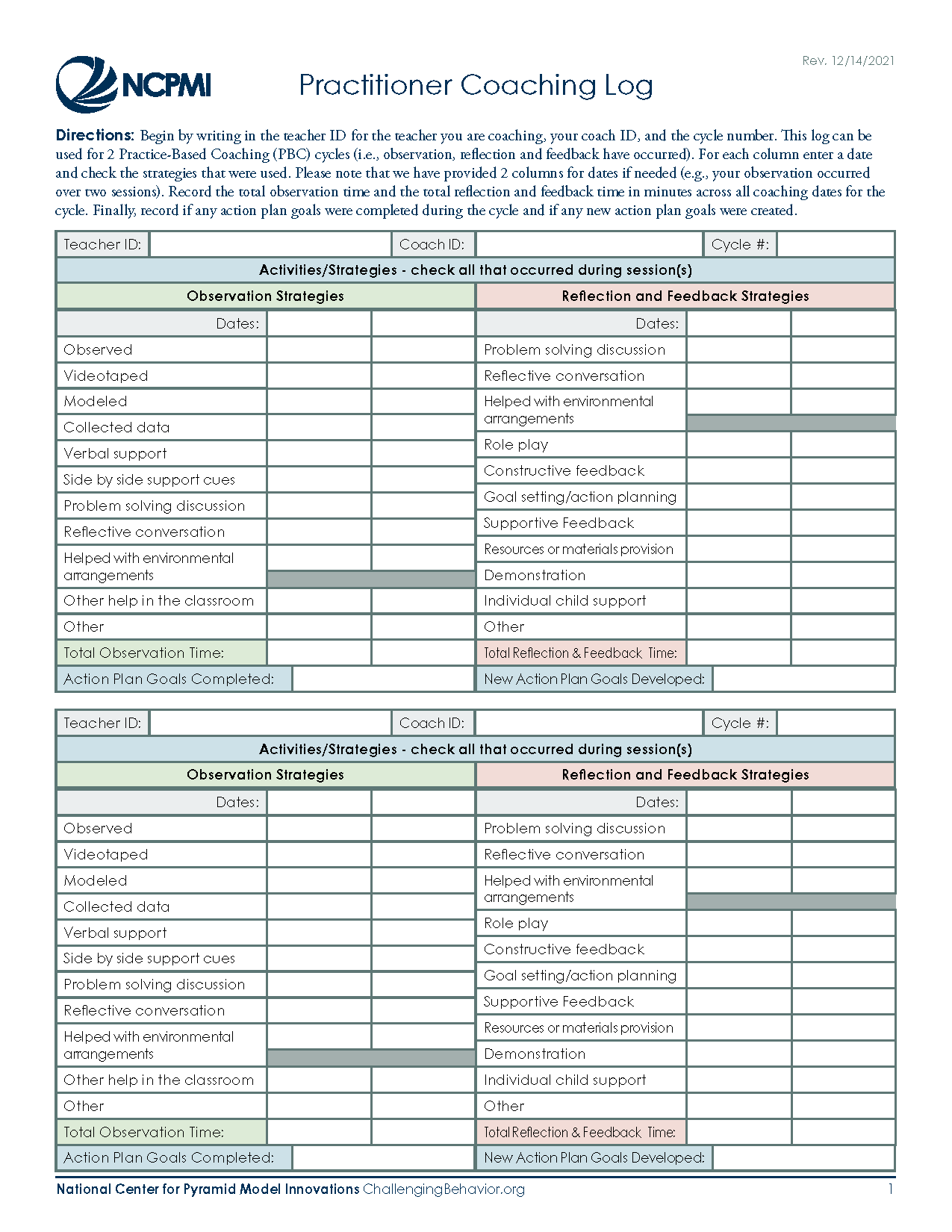
Coaching contact data provides a summary of the number and duration of coaching visits that were provided to teachers and a description of the professional development strategies used during coaching contacts. Coaching is used to support teachers in their implementation of Pyramid Practices. Coaches submit these data monthly for summary. Do you want to track your coaching contacts? This log allows you to track who received coaching and the coaching strategies that were used.

This tool can be used by practitioners working in a classroom to begin to open communication about how they are best able to work as a collaborative team.

The Coach Action Plan Goals Planning form is used by the coach to think about what goals they might suggest to the teacher when developing an action plan.

Used by the coach to reflect on TPOT observation and what goals might be suggested to the coachee during the goal plannning session.
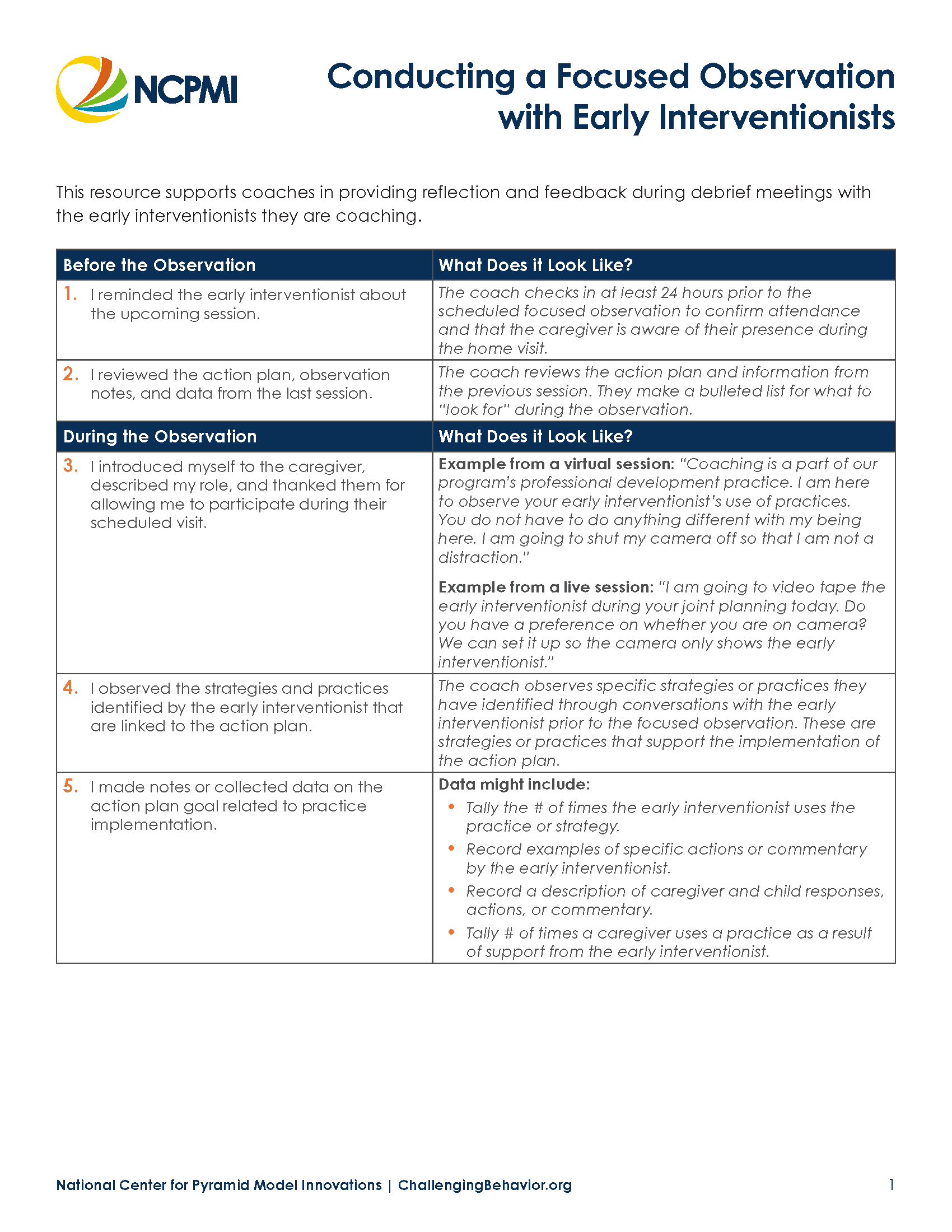
This resource supports coaches in preparing for and conducting quality focused observations with early interventionists.
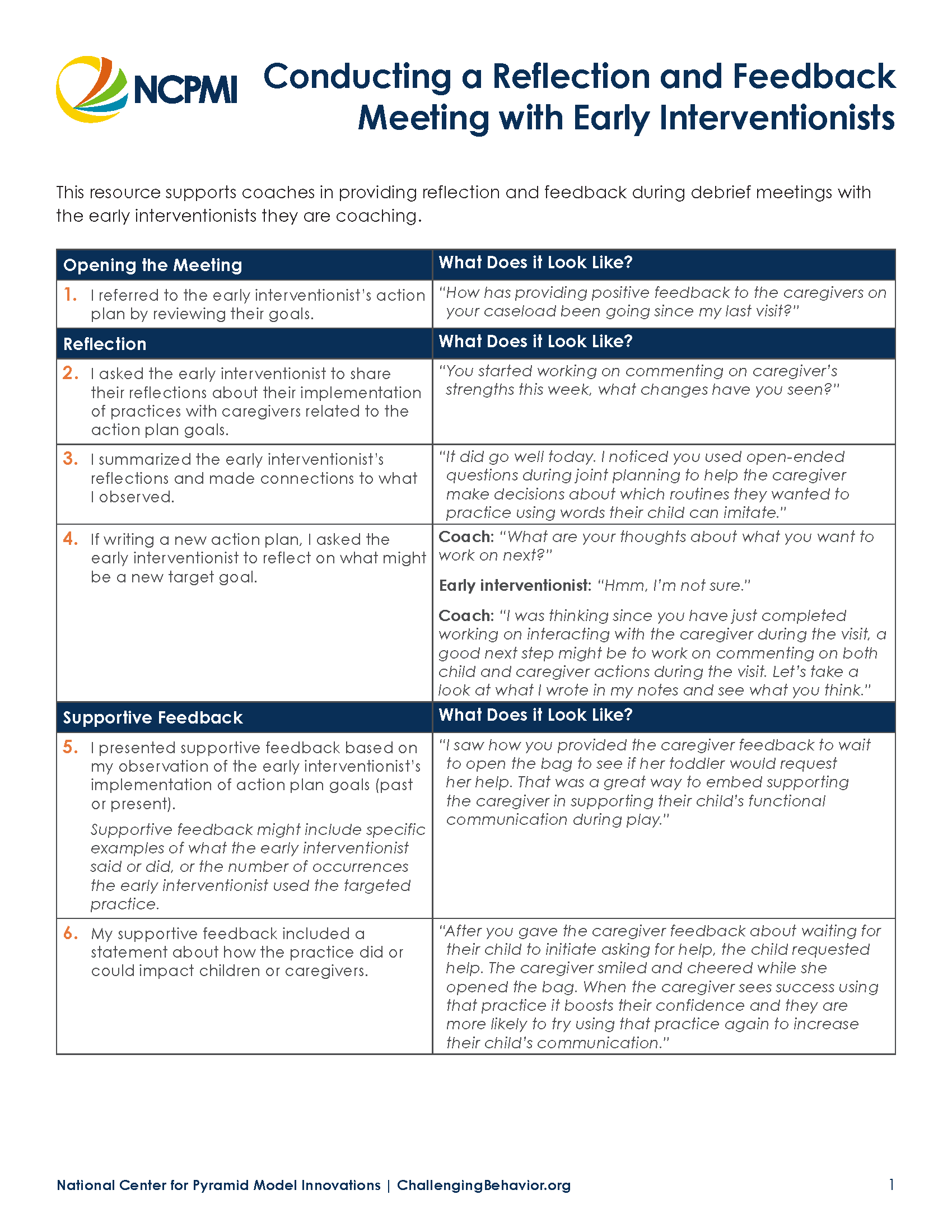
This resource supports coaches in providing reflection and feedback during debrief meetings with the early interventionists they are coaching.
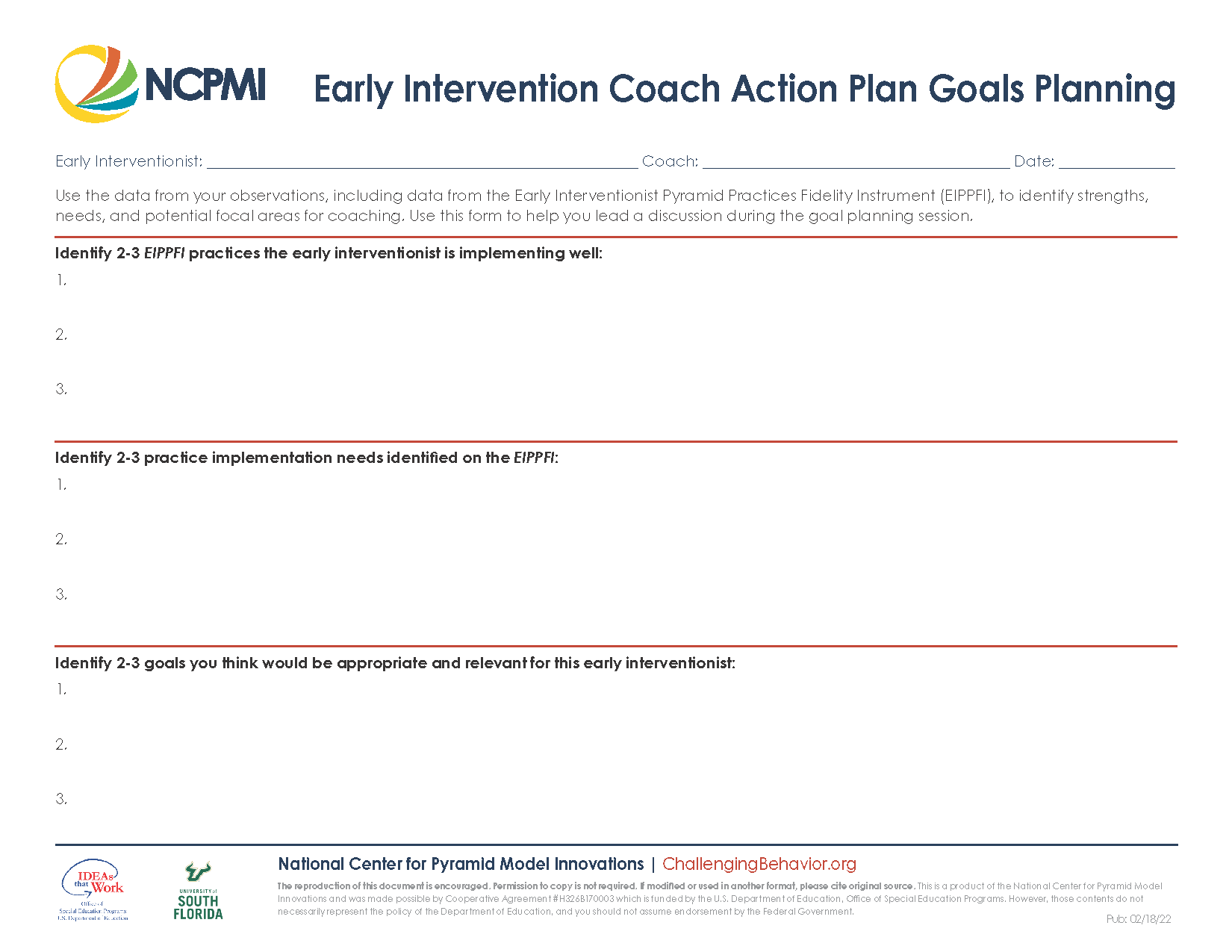
Coaches use data from observations to identify strengths, needs, and potential focal areas for coaching. Use this form to help you lead a discussion during the goal planning session.
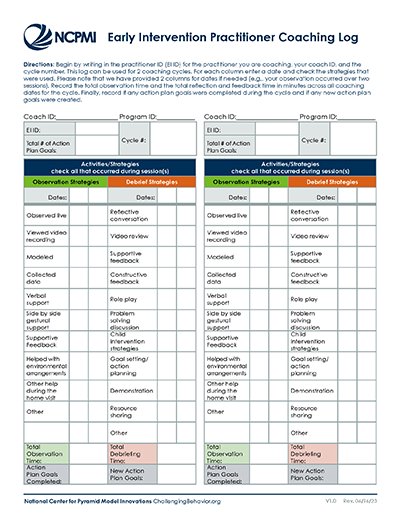
A log for practitioner coaches to use to track time, strategies, and practice-based coaching cycles provided to early intervention practitioners.
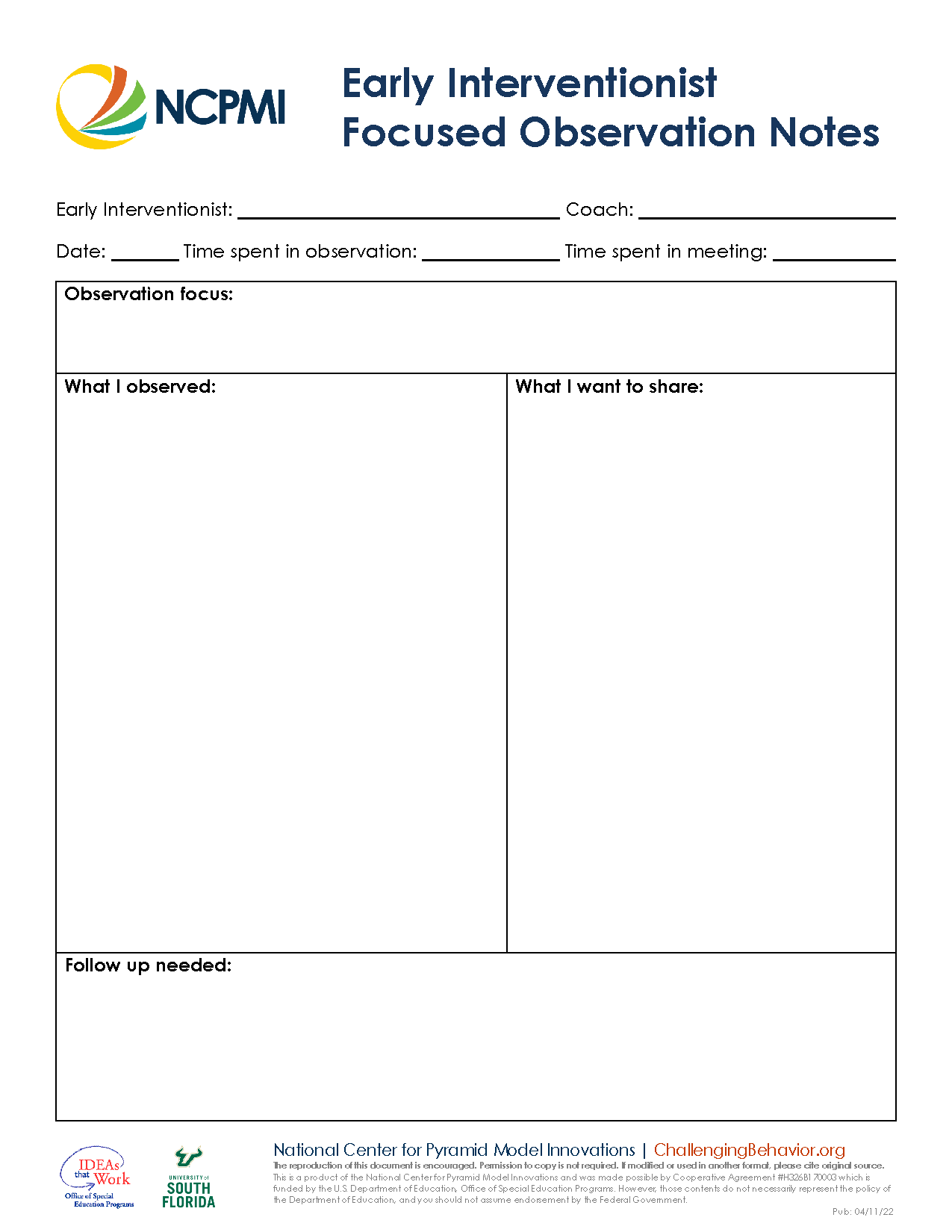
Coaches of early interventionists can use this form to record action plan related data during focused observations, and organize the information they want to share with coachees prior to the reflection and feedback meeting.
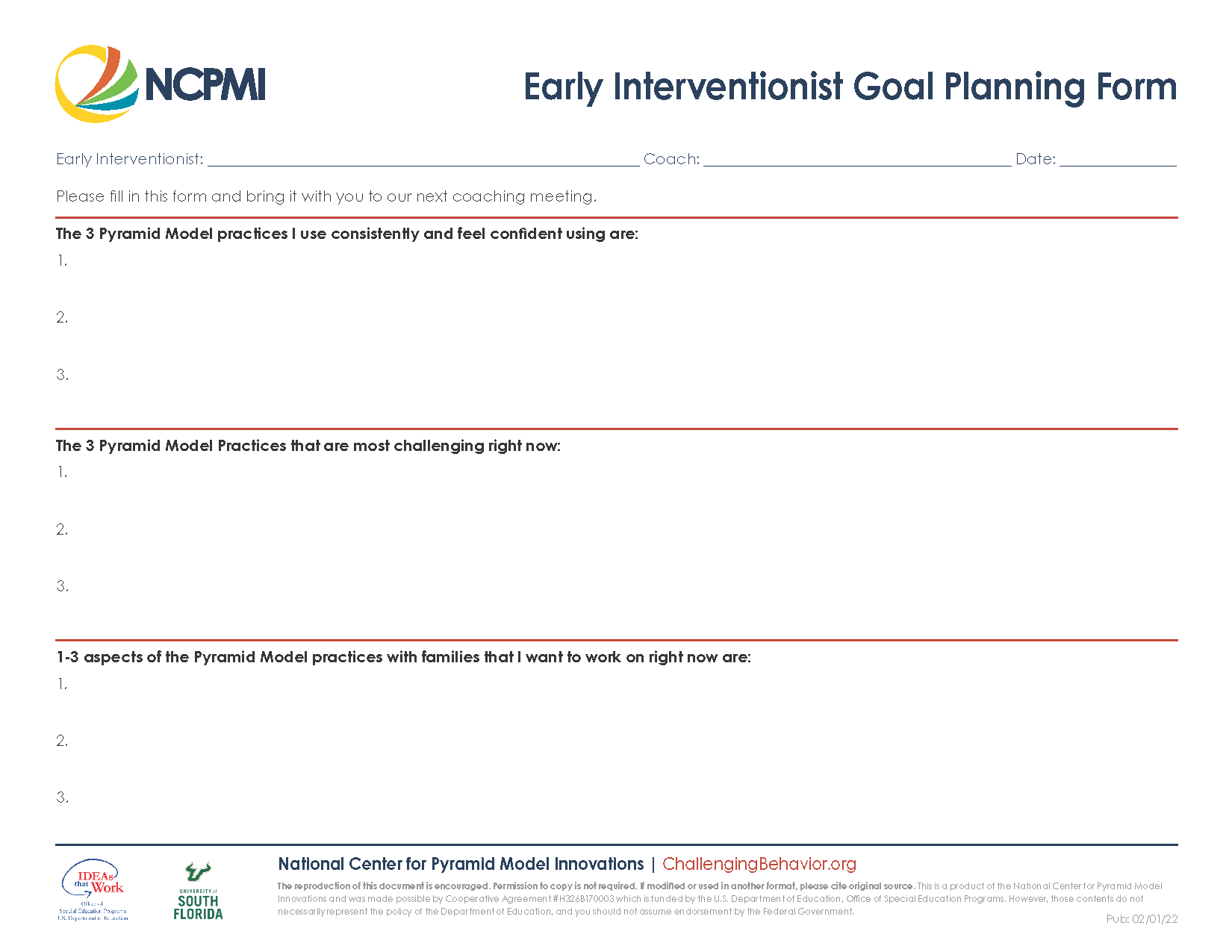
Early interventionists fill in this form, which is reviewed with their coach during coaching meetings.
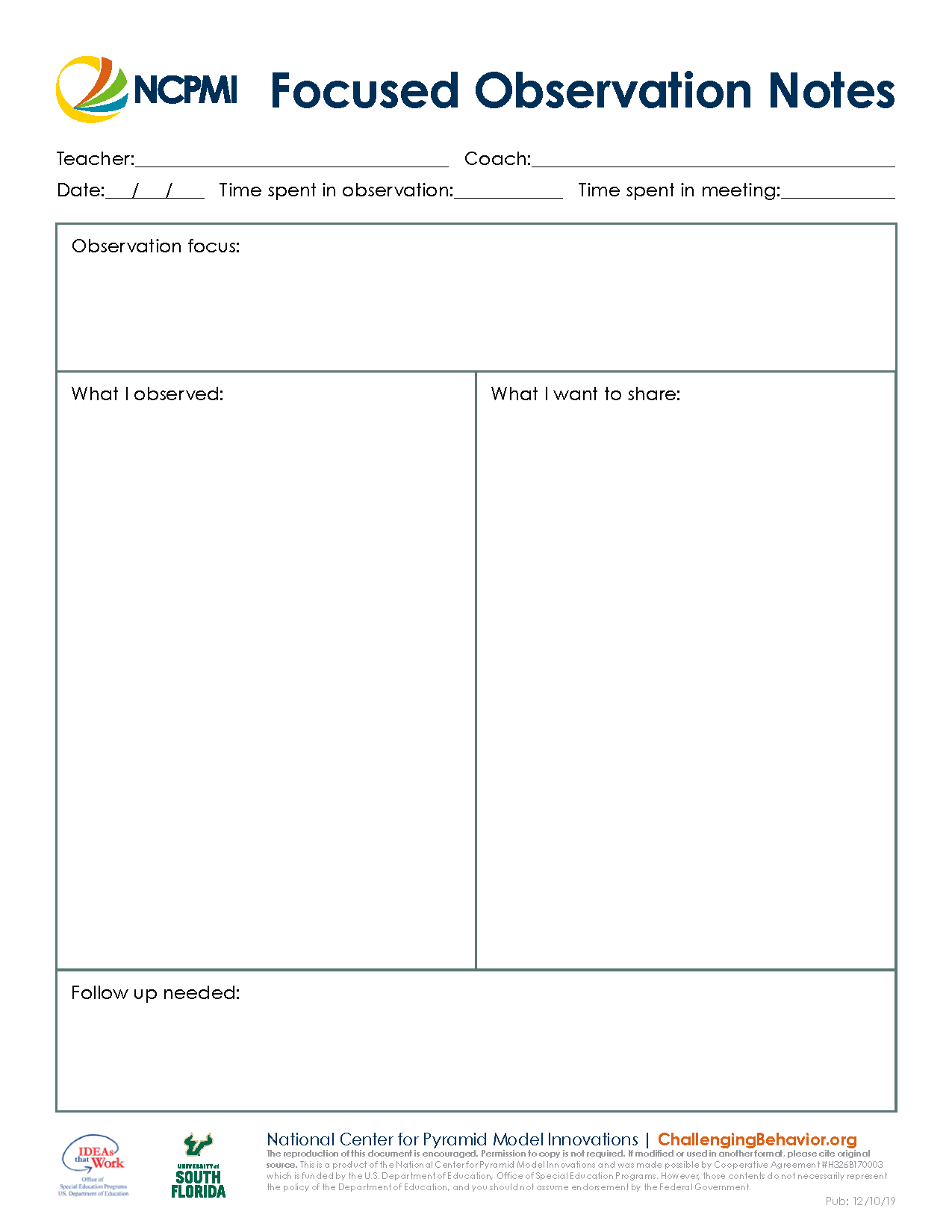
Sample template for recording notes during a Focused Observation
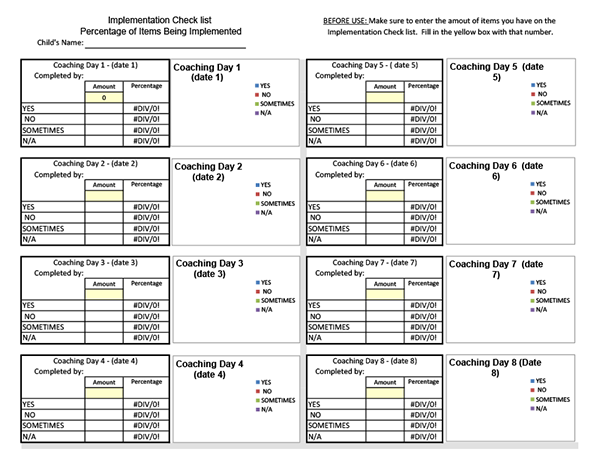
The excel spreadsheet shows the teachers’ progress with implementation.
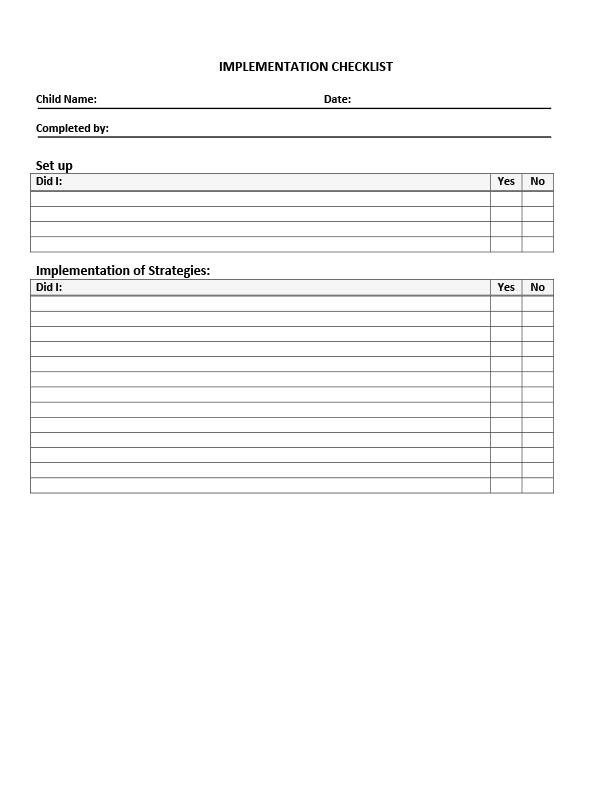
You might also want to develop a way to help the teacher with implementation fidelity. Check out this approach to using a data-based system for tracking implementation fidelity. The process involves identifying all the plan steps and then taking data on implementation.

You might also want to develop a way to help the teacher with implementation fidelity. Check out this approach to using a data-based system for tracking implementation fidelity. The process involves identifying all the plan steps and then taking data on implementation.
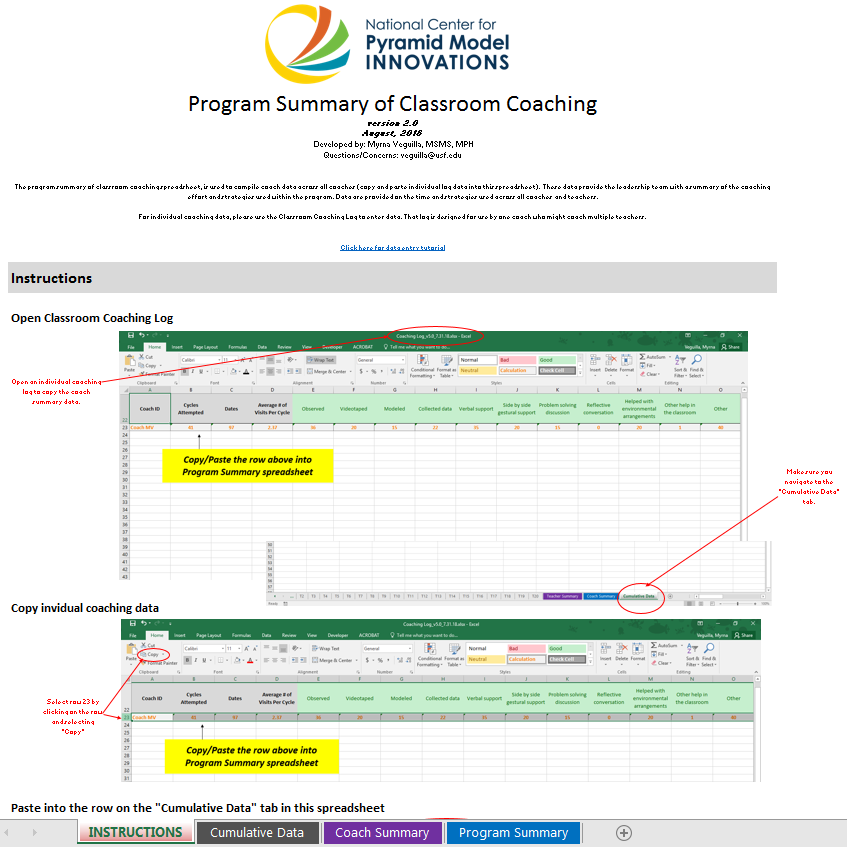
The Program Log is used to compile individual coach data across all coaches. These data provide the leadership team with a summary of the coaching effort and strategies used within the program.
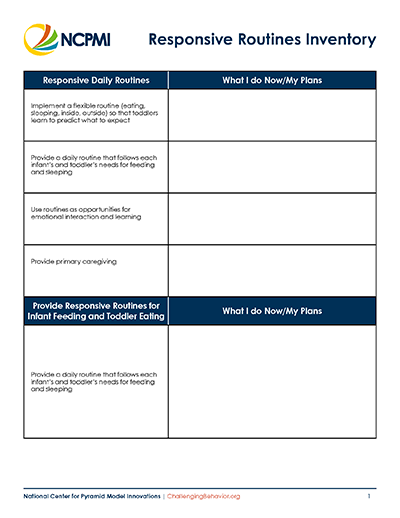
Providers and teachers can use this form to think through their current daily routines as well as help them to plan out the ways they will embed supports that are responsive to infant and toddler social-emotional development and teach new skills during specific moments in the day.
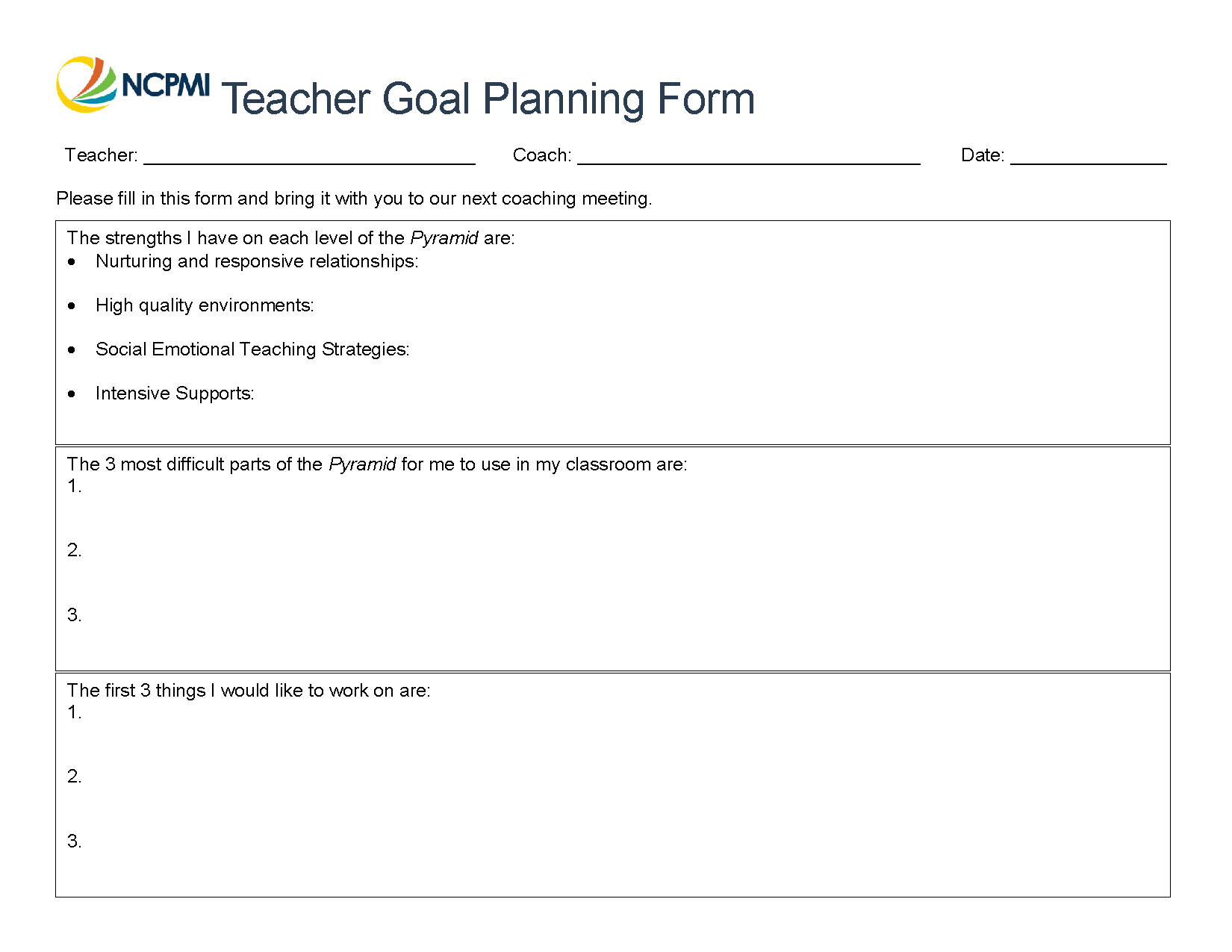
The teacher goal planning form can be used prior to action planning to help a teacher prepare his/her thoughts after Pyramid Model training.

The teacher goal planning form can be used prior to action planning to help a teacher prepare his/her thoughts after Pyramid Model training.

This sample agreement provides a context for having a discussion about the coaching relationship.

This sample agreement provides a context for having a discussion about the coaching relationship.
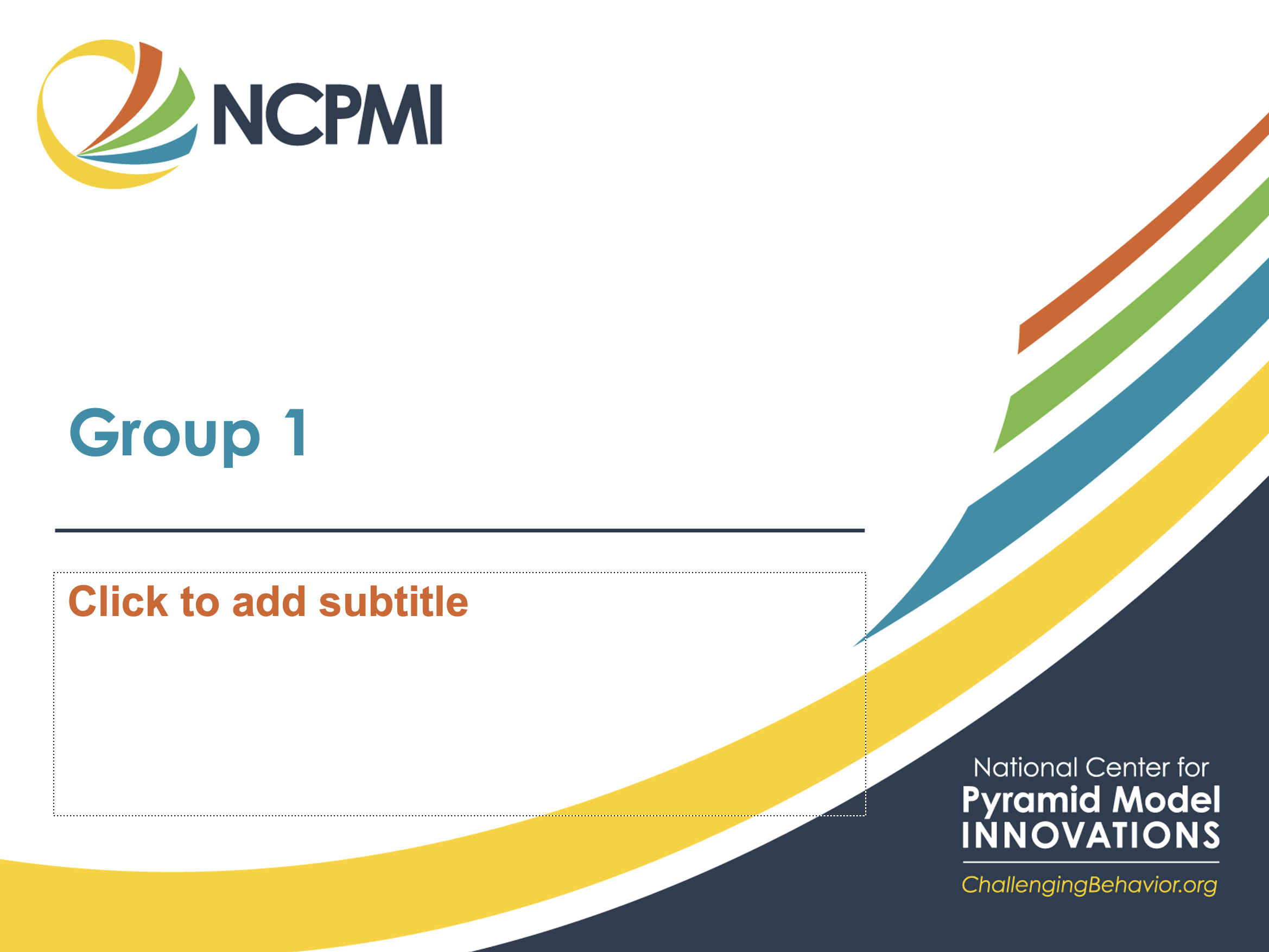
This package includes materials and resources for coaches to hold group coaching meetings.
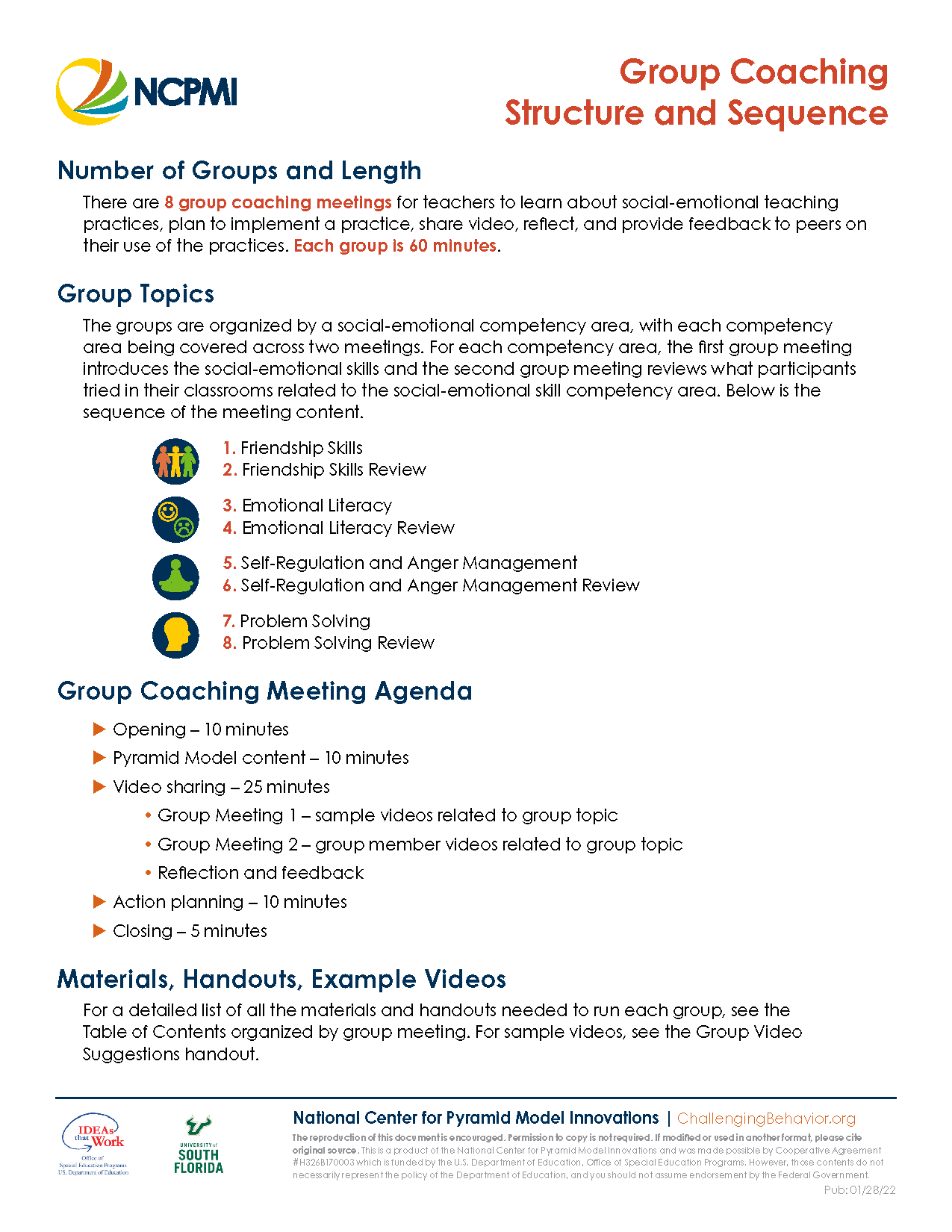
Reviews the group coaching topics and group caching meeting agenda.
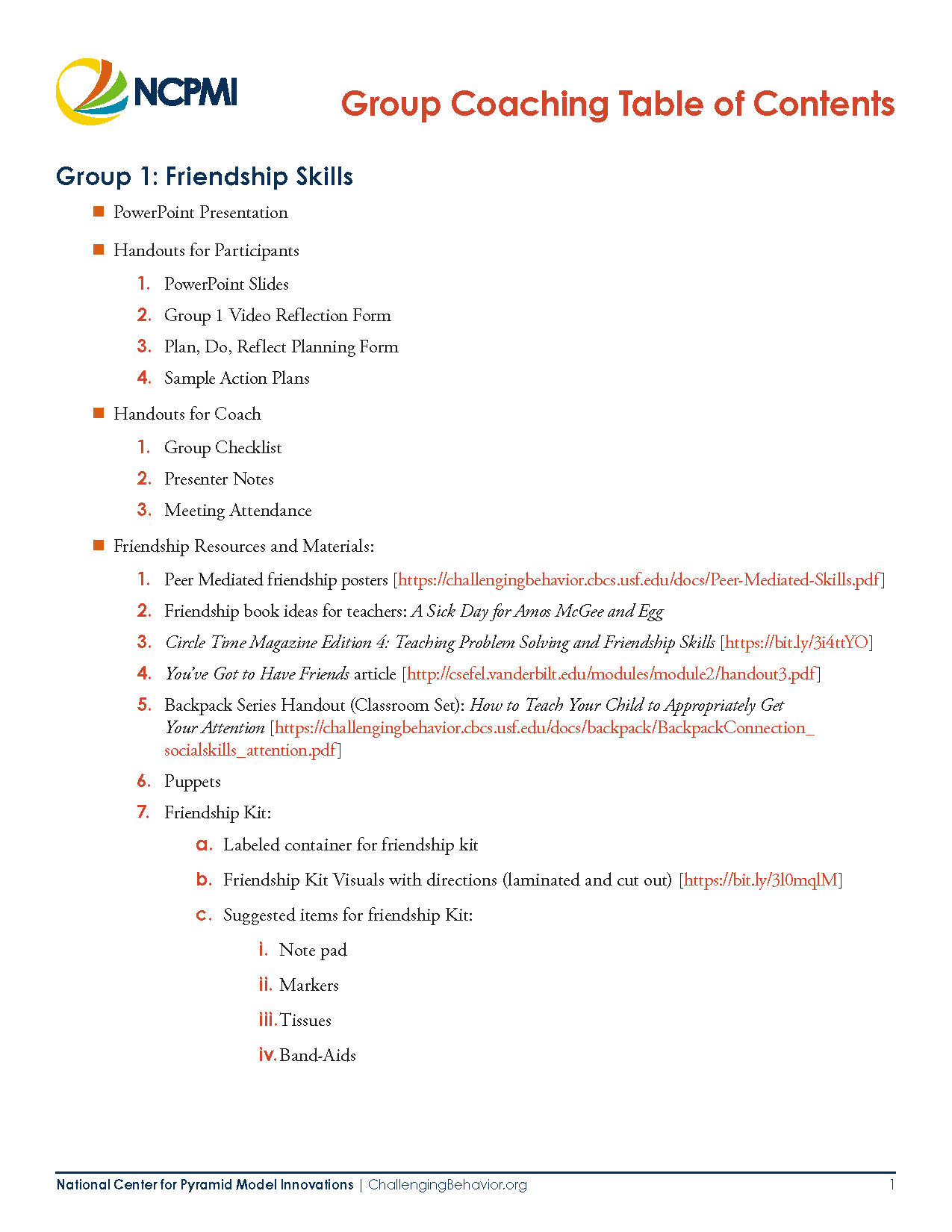
Lists the handouts, resources, and materials needed for each group.

Provides helpful tips about timing, pacing, providing opportunities for group members to share, and other considerations related to the size and make up of a group.
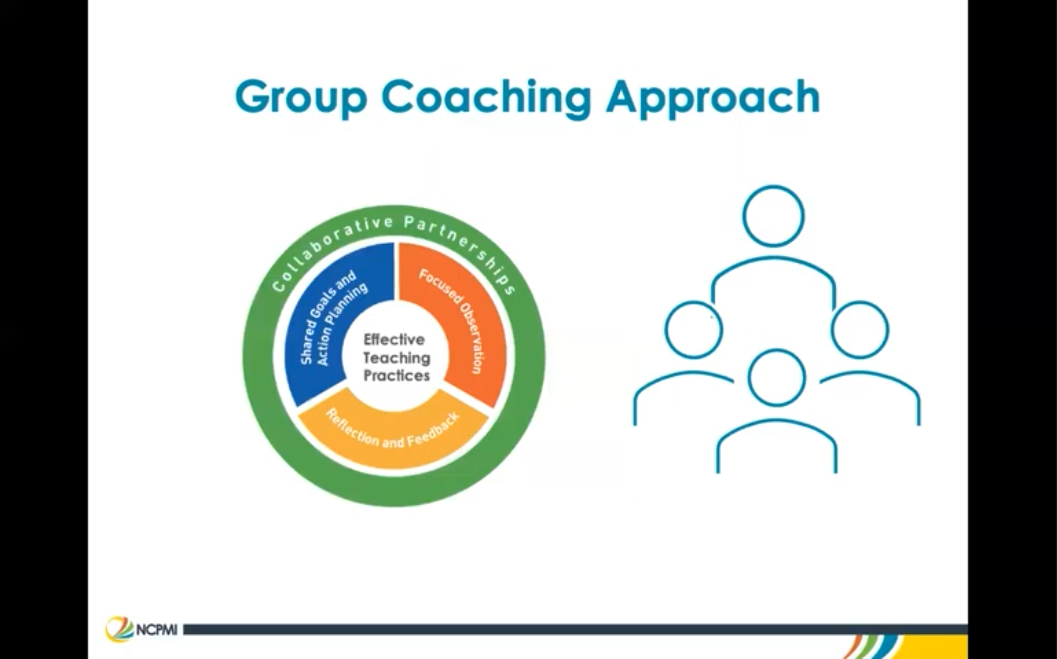
Brief presentation introducing the Group Coaching Approach and overview of the materials and resources.
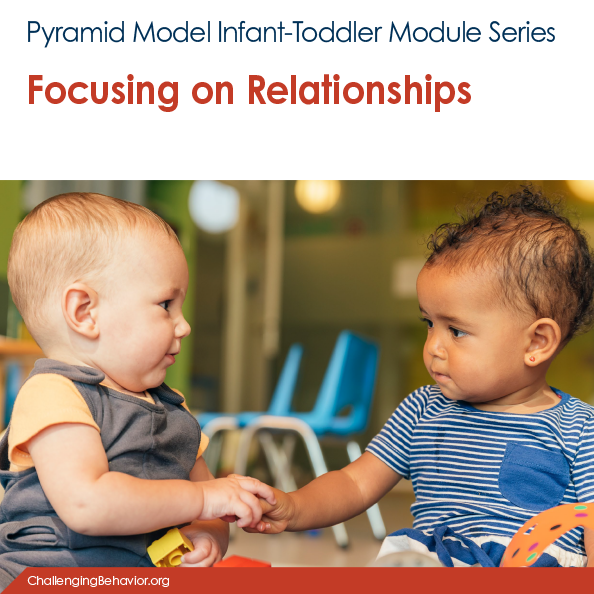
In Focusing on Relationships, a module of the Pyramid Model Infant-Toddler Module Series, participants will explore the importance and complexities of developing relationships between caregivers, families, and children. Participants should leave understanding that social-emotional development takes place within the context of relationships, so strategies to support development must prioritize building relationships. This training covers topics such as reflecting on participants’ past and current relationships, as well as addressing issues related to culture, diversity, race, equity, risk, and protective factors.
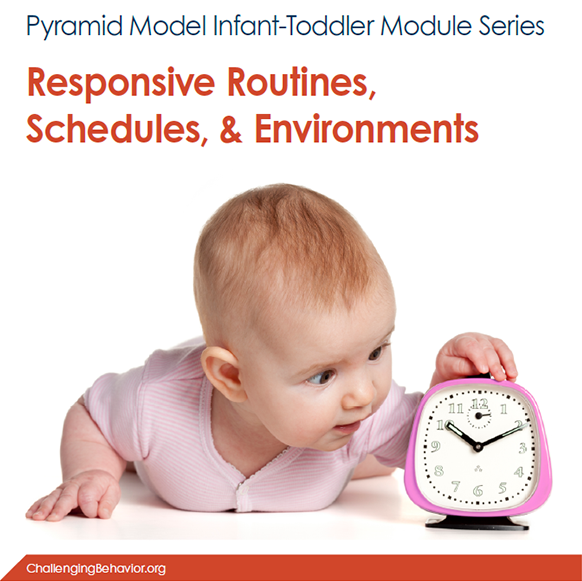
In Responsive Routines, Schedules, & Environments, a module of the Pyramid Model Infant-Toddler Module series, participants will learn how being intentional about establishing daily routines and setting up the environment can: help young children feel confident and secure, paving the way for social-emotional growth; promote children’s active and safe exploration and learning; and facilitate positive child-peer and adult-child interactions.
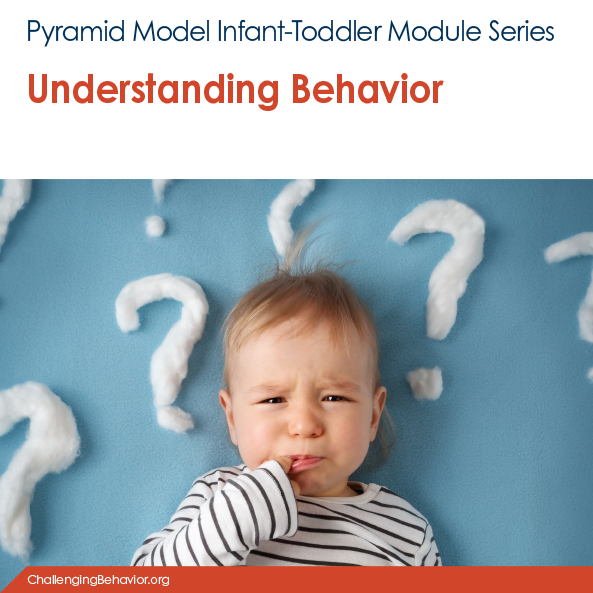
Working with infants and toddlers is rewarding, but it can also sometimes be challenging. In Understanding Behavior, a module of the Pyramid Model Infant-Toddler Module Series, participants will learn how to use observation to better understand child behavior. We will look at the many influences affecting behavior and use this knowledge to examine our own beliefs. We will practice reframing our thoughts to better respond to challenging situations.
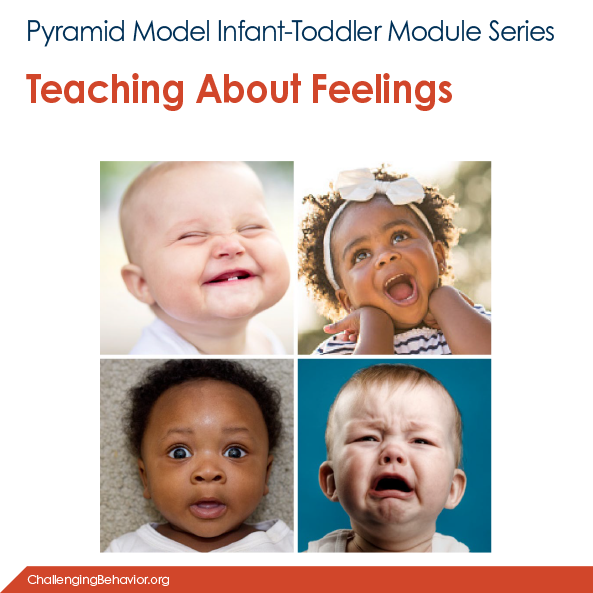
In Teaching About Feelings, a module of the Pyramid Model Infant-Toddler Module Series, participants will explore what the development of emotional literacy looks like (i.e., labeling feelings in self and others, recognizing facial and physiological signs, modulating responses, developing coping strategies) and share a variety of strategies teachers can use to support and teach the young early learners in our care about feelings.
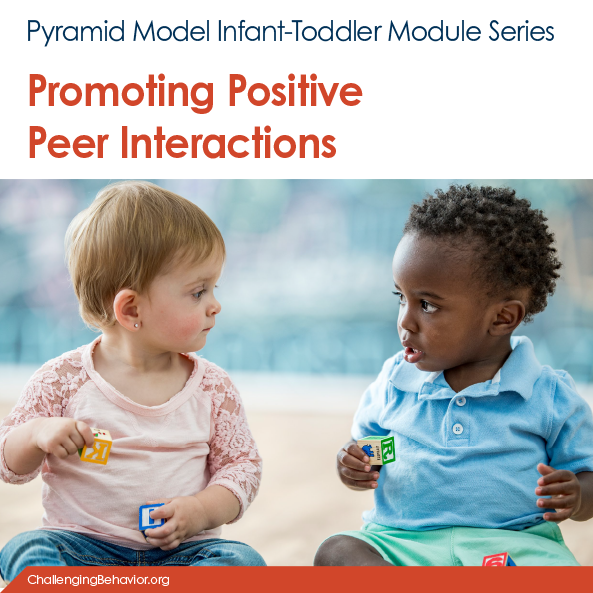
In Positive Peer Interactions, a module of the Pyramid Model Infant-Toddler Module Series, participants will gain knowledge on how to facilitate positive peer interactions and support the development of social and friendship skills, learn about the developmental stages of social and play skills, and apply that knowledge to classroom practices.
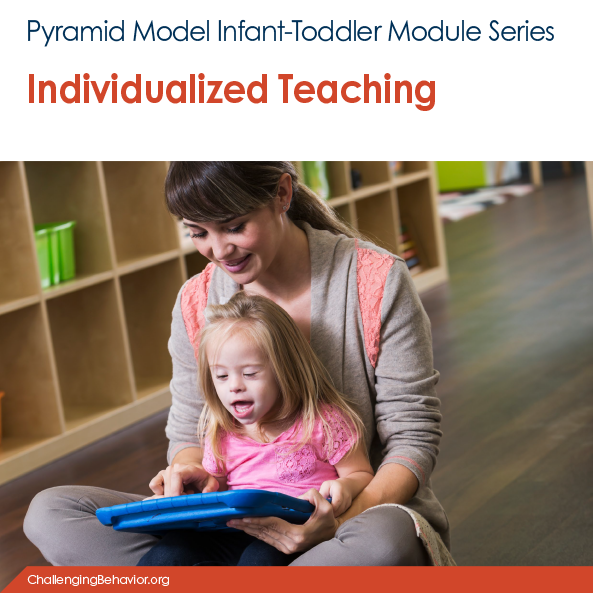
In Individualized Teaching, a module of the Pyramid Model Infant-Toddler Module Series, participants will learn how to identify and address delays in social-emotional development. The module provides an overview of the screening and assessment process and guidance on how to develop a systematic plan to provide individualized teaching to children who have delays.
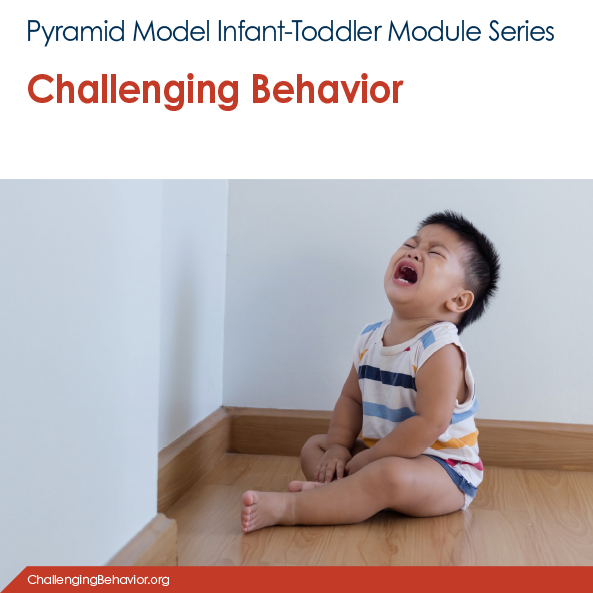
In Challenging Behavior, a module of the Pyramid Model Infant-Toddler Module Series, participants will: identify and define challenging behavior, and work to understand why challenging behavior happens; discuss how to gather data and implement strategies that will prevent challenging behavior; and discuss strategies to address or respond effectively to challenging behavior when it is present.
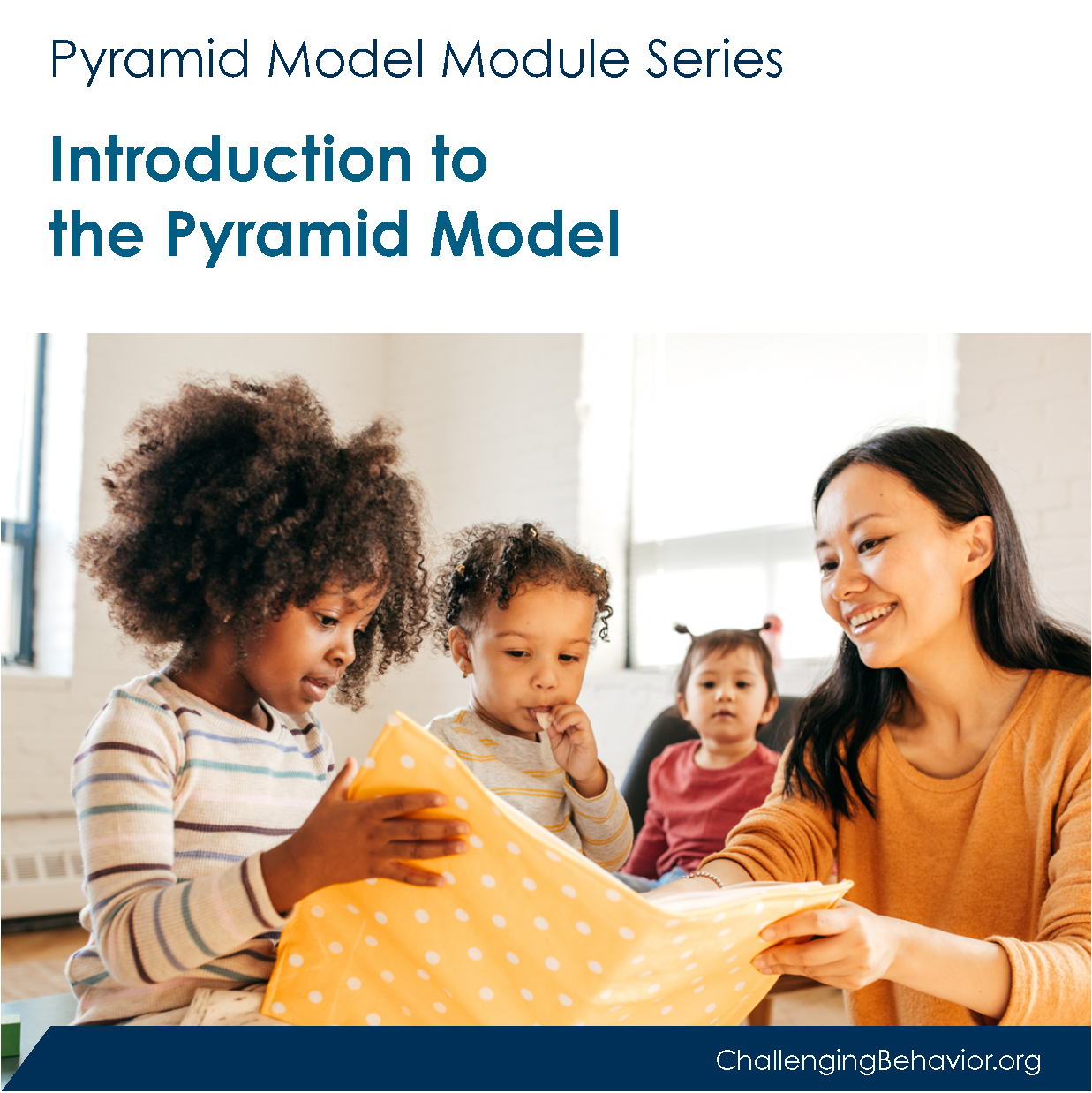
This module introduces the Pyramid Model framework to participants and should be used before the other modules. Topics include: the relationship of the Pyramid Model to prevention science, equity, inclusion, trauma-informed care, anti-bias practice and the use of data for decision-making, understanding child behavior, and the research that provides an evidence-base for the use of the Pyramid Model.
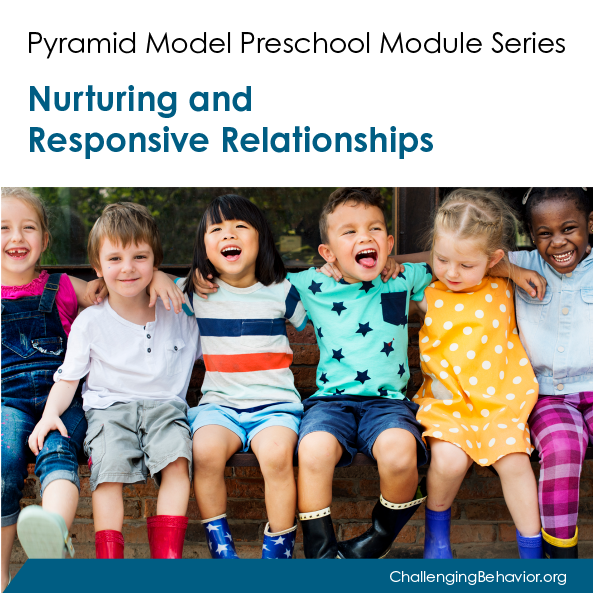
Establishing nurturing and responsive relationships within a caring community is the foundation of the Pyramid Model. This training focuses on practices for building relationships with children, promoting relationships between children, relationships with families that affirm family culture and identity, and relationships with team members.

This module focuses on the practices for establishing high-quality supportive classroom environments that promote social-emotional skill development and prevent challenging behavior. Practices related to schedules, routines, transitions, promoting engagement, expectations, and rules are addressed in the workshop.
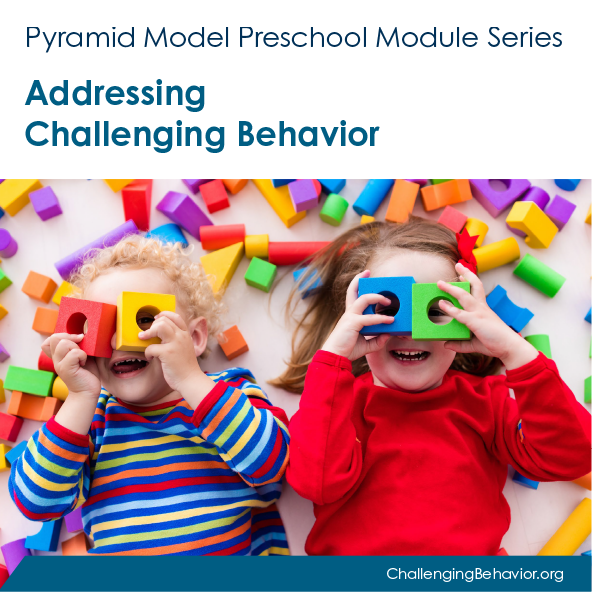
This module provides the practices for understanding child challenging behavior, how to respond to challenging behavior, becoming aware of bias in responding, de-escalating behavior, and the components of developing a behavior support plan for children with persistent challenging behavior.

In this module, practitioners learn about the steps of Prevent-Teach-Reinforce for Young Children (PTR-YC) and how PTR-YC is used as a manualized process for conducting a functional behavioral assessment and developing a behavior support plan.
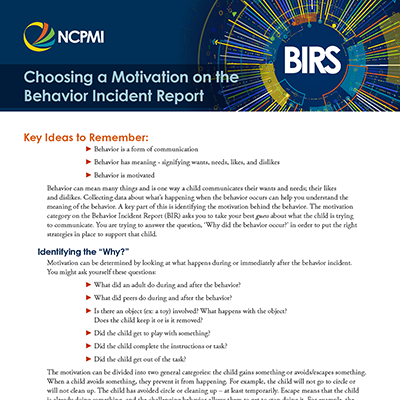
This tip sheet explains the “motivation” category on the BIR. It includes a table of examples and tips for teachers to complete that section of the form when they’re unsure of the motivation.
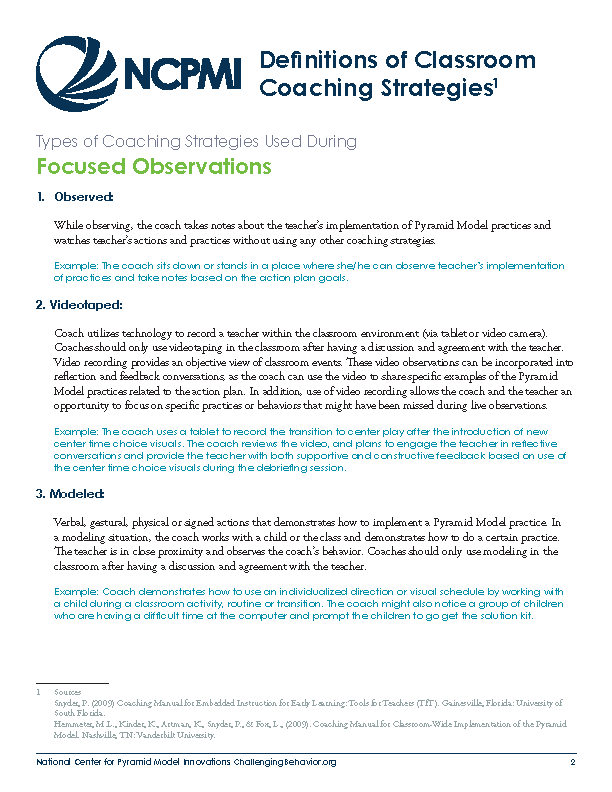
What are the strategies that can be used during your observations and debriefing sessions? This handout provides a list and operational definitions.
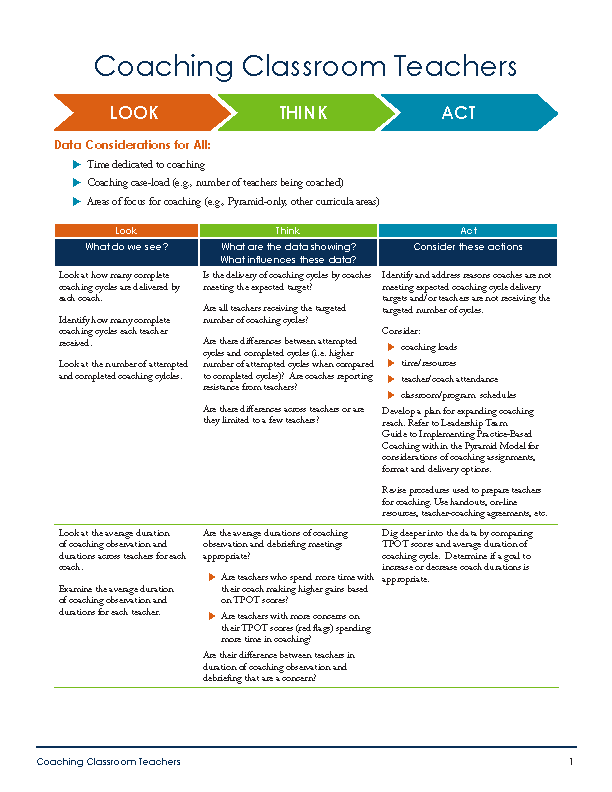
The Leadership Team can use this document to guide the three steps of data review and decision-making (Look-Think-Act). The guide provides the information on the data to review, the questions to consider, and potential actions. This guide is used to examine data from the individual classroom coaching log and program coaching data summary.
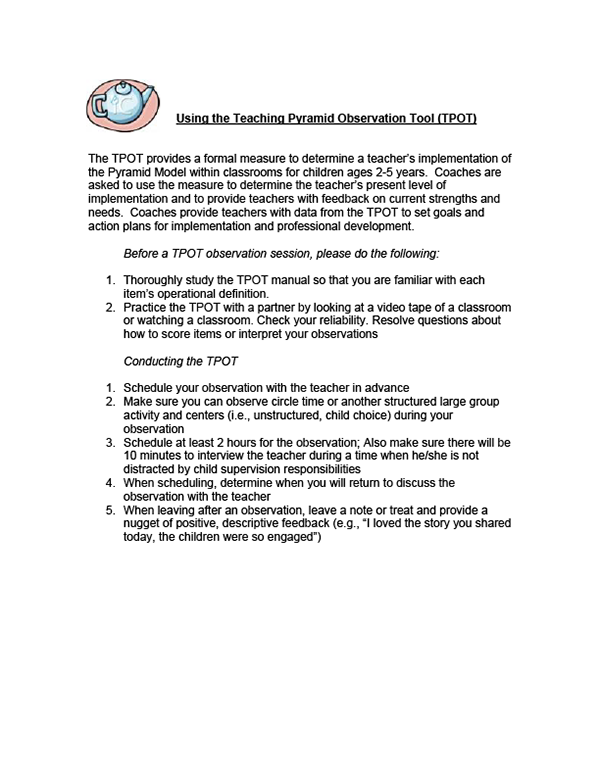
Many coaches use the Teaching Pyramid Observation Tool to provide data on Pyramid Model practices implementation within classrooms for 2-5 year olds. This form provides some guidance on how the TPOT is used for data-driven coaching.
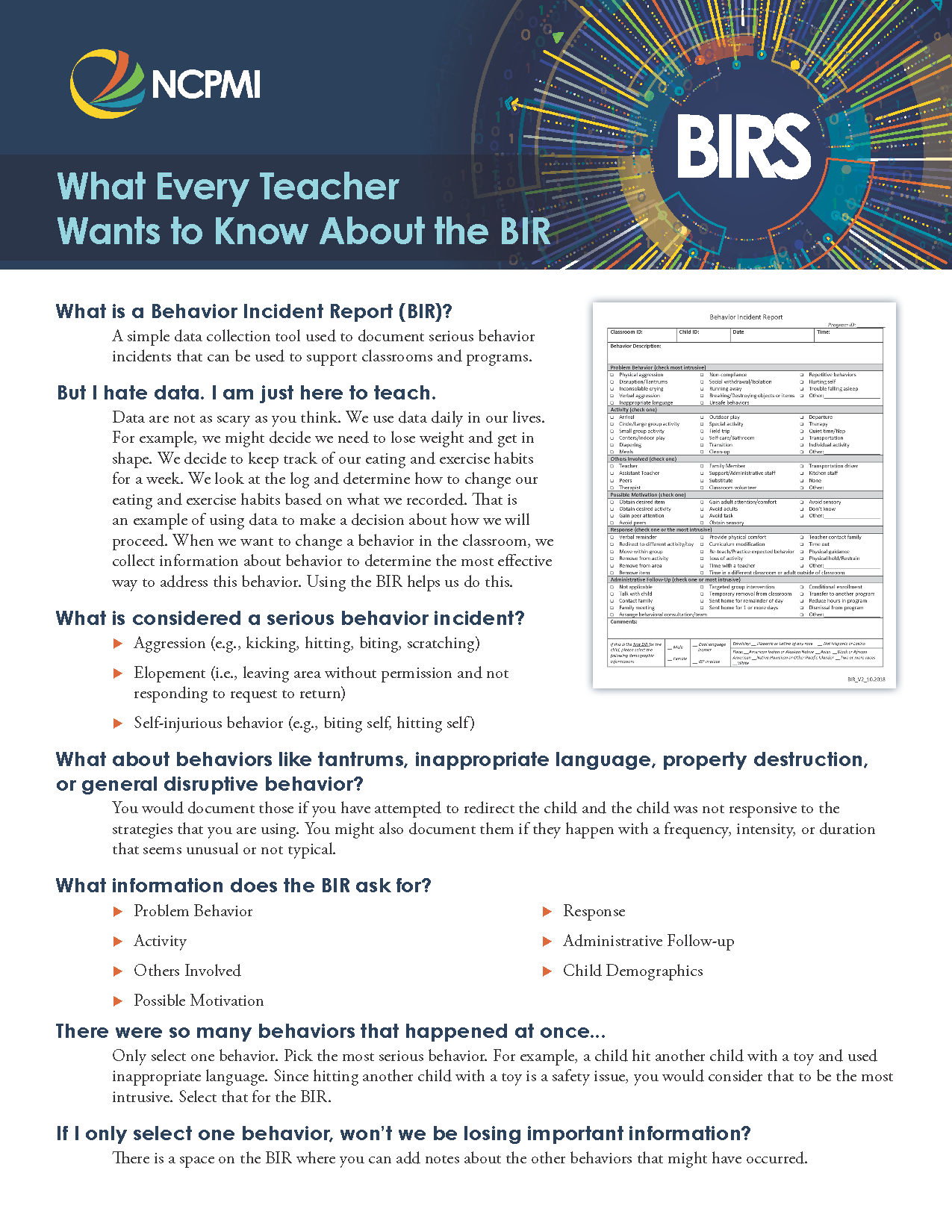
This handout provides teachers with information about the BIR and how they will collect data in the classroom.

Pyramid Model Classroom Coach Raquel Lima discusses how to establish a trusting, collaborative coaching relationship with a classroom teacher.

Pyramid Model Classroom Coach Raquel Lima discusses how to establish a trusting, collaborative coaching relationship with a classroom teacher.

The beginning of the school year is a busy time for programs, practitioners and coaches alike. Coaches may feel overwhelmed by balancing their time getting to know their coachees, preparing for visits, travel, observing, creating materials, or planning for debriefing meetings. It might be difficult to know where to start. In this webinar, panelists will share practical strategies for planning and managing time around coaching caseloads.

Pyramid Model Classroom Coach Raquel Lima share a coaching success story.

Pyramid Model Classroom Coach Raquel Lima share a coaching success story.

Coaching teachers to use universal Pyramid Model practices can have a positive impact on both teachers? and young children’s daily experiences in early childhood classrooms. What if there are children in the classroom who need a little more help to follow routines, understand expectations, regulate their emotions, or connect to their peers? Join our panelists as they discuss their experiences and processes for working with teachers to individualize Pyramid Model practices in their classrooms.

As a coach do you ever feel stuck? Do you ever wonder how your conversations might help facilitate increased practice change? Do you ever consider how you might be able to get more buy-in from practitioners for Pyramid implementation? Changing practice can be hard. Practitioners are mostly likely to change their practice when changes align with their own values and goals. Motivational interviewing can support practitioners to reflect on their own values and goals. These strategies can also support practitioners to reflect on their ambivalence about practice change. This webinar explored strategies such as asking open ended questions, validating, offering affirmations, reflective listening, and evoking practitioners’ ideas about change.

In this webinar, ML Hemmeter will lead a discussion with a panel of teachers who have been coached using the Practice-Based Coaching framework. Join us as they share their perspectives implementing the Pyramid Model in early childhood settings and insights on how coaching supported their teaching practice.

Coaches work collaboratively with teachers to support them in implementing Pyramid Model practices. Pyramid Model practices are designed to support young children’s development of social-emotional competence including emotional literacy, problem-solving, communicate their wants and needs, and peer relationship skills and to decrease the likelihood they will engage in challenging behavior. How do coaches support teachers to ensure they are using Pyramid Model practices to address the individual needs of each and every child in their classroom? In this webinar, panelists will discuss ways coaches can support teachers to implement Pyramid Model practices equitably.
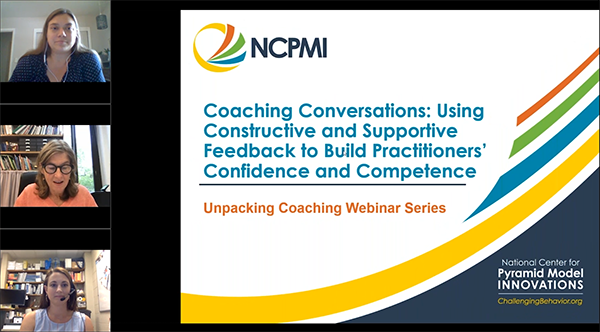
Practitioner coaches often feel most comfortable providing supportive feedback to practitioners. However, coaches are sometimes left wondering how to provide effective constructive feedback, while still maintaining positive partnerships and buy-in from practitioners. This webinar highlights how the reflection and feedback component of Practice-Based Coaching occurs within the context of collaborative partnerships. Panelists discuss how to prepare for reflection and feedback with practitioners, and share tips and strategies for providing supportive and constructive feedback, and reflective questioning techniques.

As a coach have you ever observed a teacher or early interventionist that seems down or is disengaged with children or families? Have you ever worried about the level of a provider’s stress? Have you been unsure what to say or how to help? Research has demonstrated a link between early childhood teachers’ poor health and mental health and decreased quality to provide high quality care for young children (Esquivel et al., 2016). Additionally, recent studies have identified early childhood teachers are more likely than the general population to have health and mental health challenges. Early interventionists often experience significant work stress related to the emotional toll of working closely with families who are worried about their children, heavy workload, and time constraints.
Motivational interviewing strategies can help. This webinar gives examples of how motivational interviewing strategies such as asking open ended questions, reflective listening, validating, affirming, offering empathy, and many more can support teachers’ well-being and improve teacher engagement in coaching and with the children in their care.

Due to the COVID pandemic, coaches and coachees have needed to adapt their coaching delivery and social-emotional teaching practices to a virtual format. Some of these practices are easier to adapt than others, leaving coaches and coachees wondering what to do. This webinar discusses how Pyramid Model practices can be used in virtual learning and strategies for implementing coaching of teachers virtually, including how to conduct observations and collect information on coachee practices.
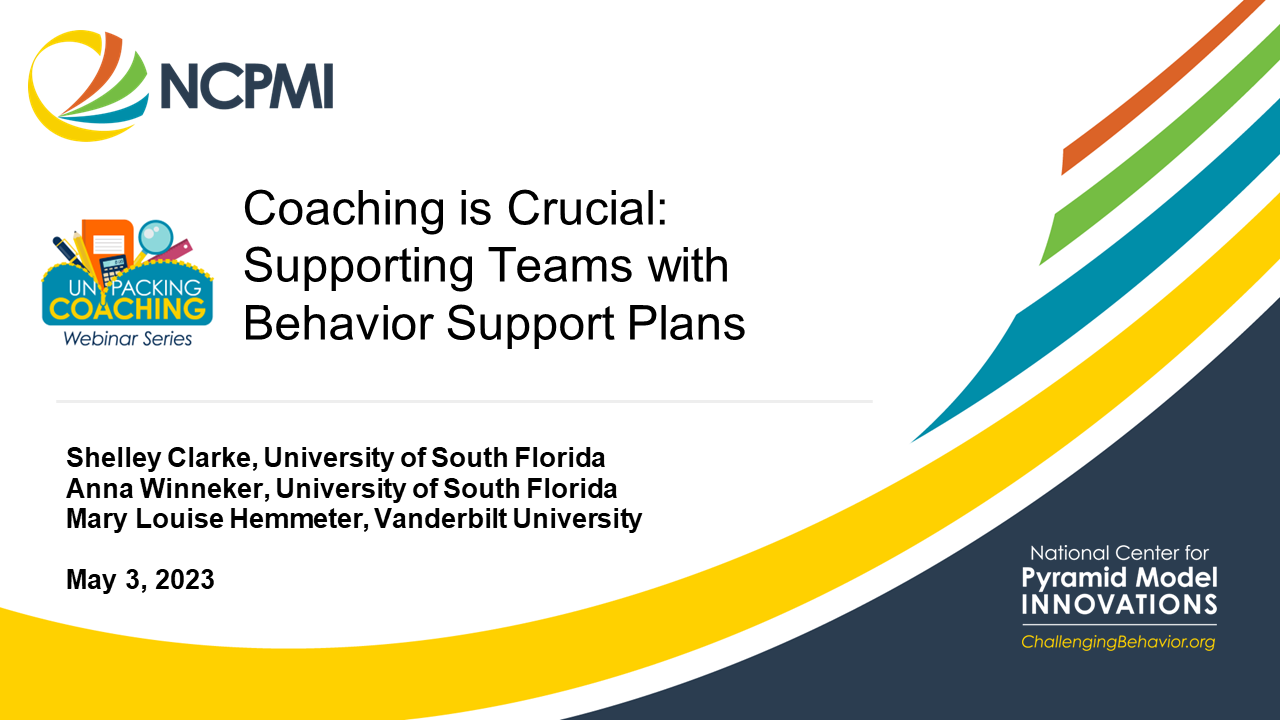
This webinar will focus on how to support teams to effectively implement an individualized behavior support plan. Hear from coaches, teachers, and families about their experiences with the Tier 3 process. Strategies and ideas will be shared.

When using PBC, coaches use strategies to build collaborative partnerships with coachees, conduct focused observations, guide reflection and provide feedback to guide coachees in meeting their professional goals. For coaching to work, there are specific evidence-based practices coaches use. In addition, coaches must learn to provide different levels of support based on individual coachees? needs. Fidelity, or the ability to use these evidence-based coaching practices the way they are meant to be used, is essential to delivering coaching effectively. For coaching to be effective, it must be delivered with fidelity. In this webinar, panelists will discuss the tools you can use to ensure you are using PBC with fidelity.

Teacher notices children needed support to problem solve and the solution they choose is a calm down strategy. Includes modeling, guided practice, and visuals.

Distance coaching has been an option to address challenges in finding time and opportunities to meet. These challenges are especially evident in family childcare and rural settings. Due to our country’s recent events, many coaches are finding ways to do their coaching from a distance. We discuss distance coaching as one way to address this issue. We also discuss the successes and challenges of distance coaching through our panelists? experiences, and how program leadership teams and coaches can implement specific supports to make distance coaching successful.
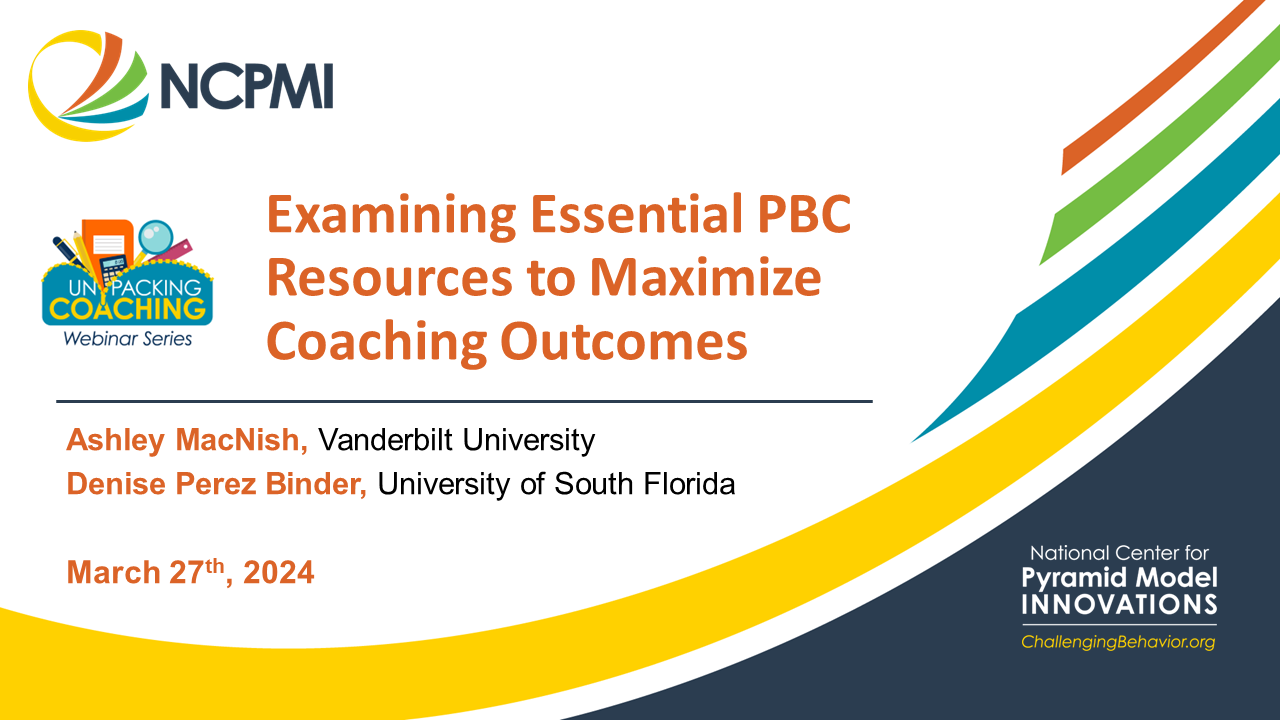
Does your coaching toolbox need a refresh? Join us as we walk through key coaching resources to help you organize and use your coaching tools with intention. We will show you where to locate each resource and how to use them to enhance your efficiency as a coach. We will highlight resources that have been recently updated. By the end of this webinar, you will be able to know how to use each resource, and use coaching data to make decisions to maximize your coaching efforts.

Teacher reads a story and talks about emotions with the children.
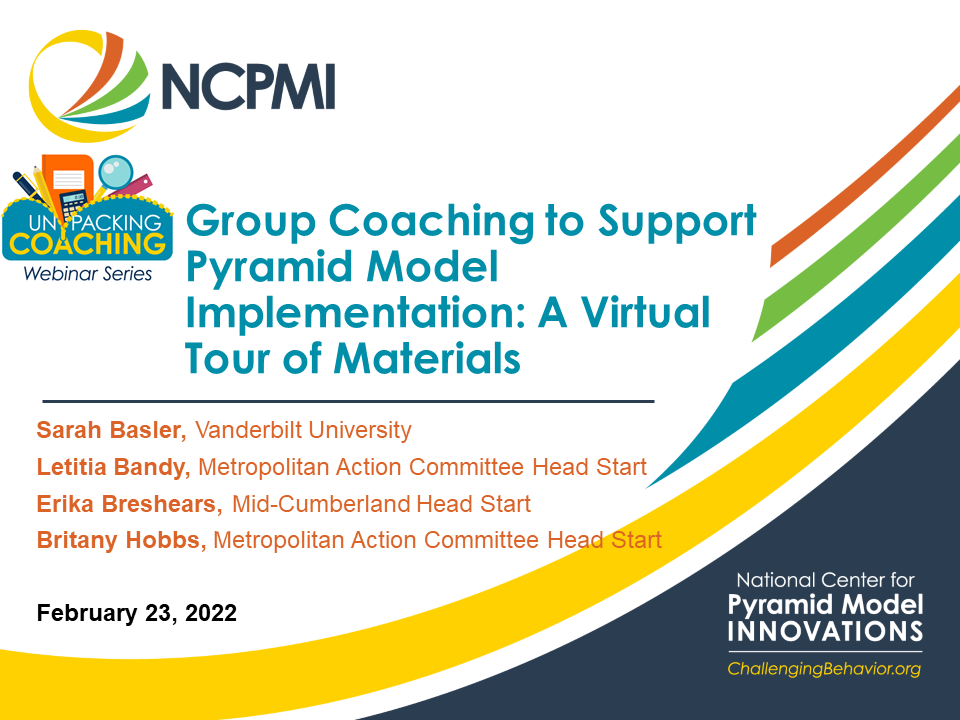
This webinar will highlight the newly released group coaching materials available through the National Center for Pyramid Innovations. Presenters will provide a virtual tour of the package. Materials are included for 8 group coaching meetings for practitioners to learn about: social-emotional teaching practices, planning to implement a practice, sharing video, reflection, and providing feedback to peers on their use of the practices. Presenters will review the structure and sequence of the group coaching meetings and provide helpful tips for getting organized with the group coaching materials.
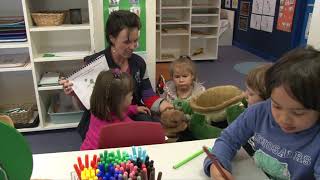
Child is coloring a picture of a turtle and the teacher takes the opportunity to teach an impromptu lesson on Tucker the Turtle.

Brief presentation introducing the Group Coaching Approach and overview of the materials and resources.

This is a short introduction to the Guided Action Plan (GAP) resource bundle, which describes what a GAP is, how it might be used in practice-based coaching, and the resources included in this bundle. Included are considerations and tips for using the materials.

This webinar unpacks the action planning component of the PBC cycle. Presenters discuss identifying an action plan goal, the components of an effective action plan, and the coach practitioner collaborative relationship during the action planning process.
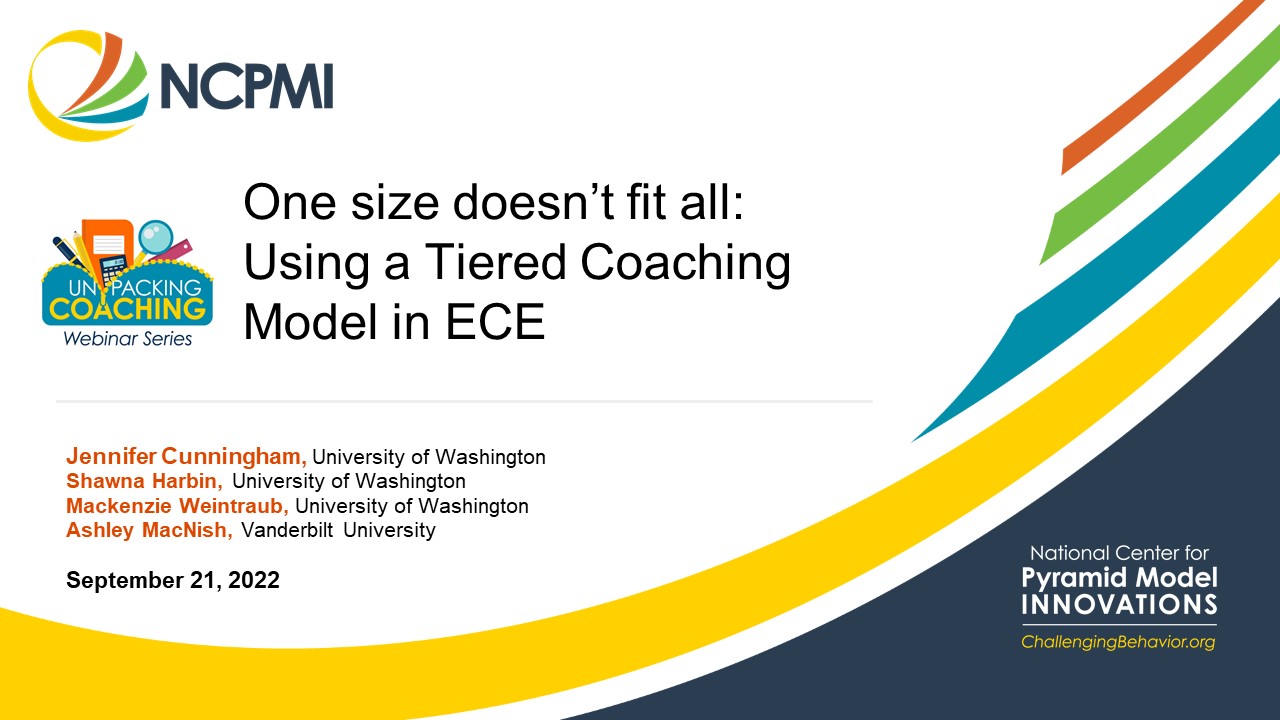
This webinar will focus on strategies and tools for implementing the Tiered Coaching Model (TCM), an innovative, data-driven coaching framework for supporting teachers in implementing evidence-based practices (EBPs) in their early childhood education (ECE) classrooms. TCM is designed to provide Practice-Based Coaching supports that are responsive to individual teachers’ preferences and needs. Participants will learn about each of the components of the TCM, and a panel of expert coaches will share their insights and perspectives on using the model to support teachers in implementing Pyramid Model practices in their classrooms.

Pyramid Model Classroom Coach Raquel Lima describes positive outcomes for classroom teachers after Pyramid Model implementation.

Pyramid Model Classroom Coach Raquel Lima describes positive outcomes for classroom teachers after Pyramid Model implementation.
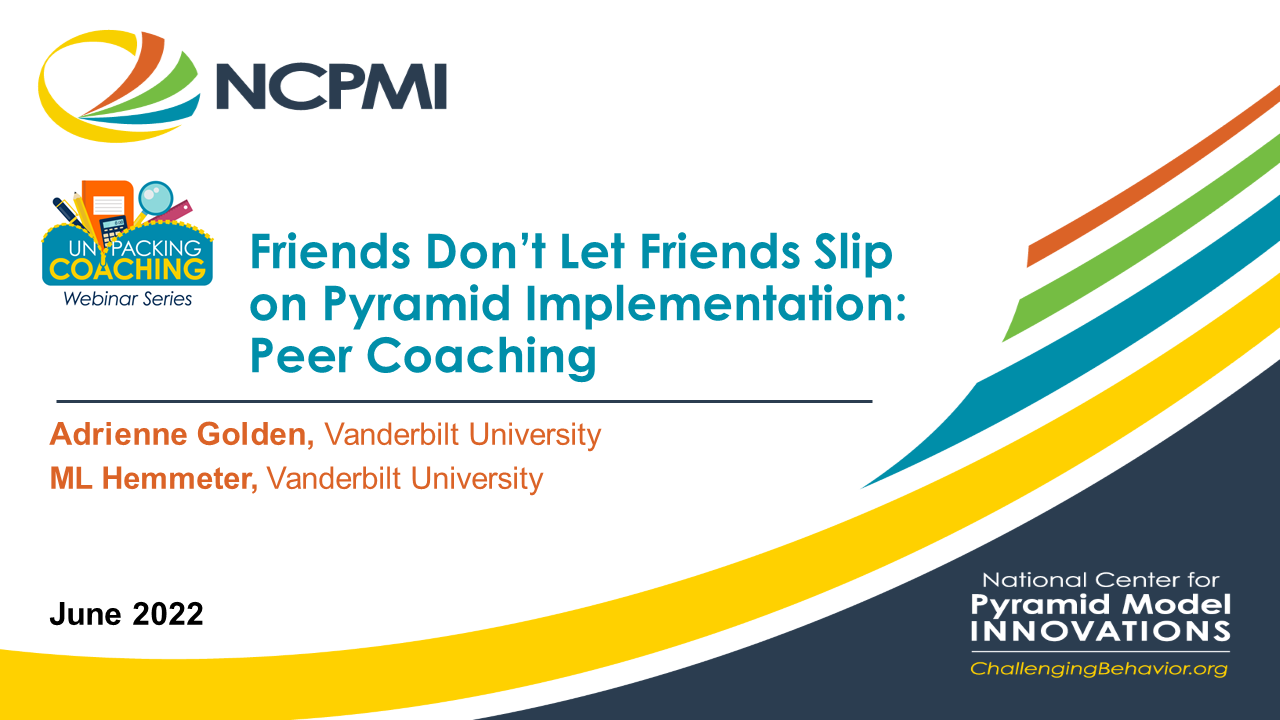
This webinar provides participants with a process for setting up and implementing a reciprocal peer coaching model in early childhood classrooms. Data evaluating the effectiveness of the reciprocal peer coaching model will be discussed briefly. The presenter will then walk participants through a three-step system for using peer coaching in early childhood classrooms: 1) planning, 2) implementing, and 3) monitoring. Participants will be provided with a peer coaching protocol and examples of data sheets. During the session, participants will have the opportunity to practice conducting a brief peer coaching session.

Pyramid Model Classroom Coach Raquel Lima explains how she uses practice-based coaching to support Pyramid Model implementation.

Pyramid Model Classroom Coach Raquel Lima explains how she uses practice-based coaching to support Pyramid Model implementation.

Teacher guides children having a disagreement through the problem-solving steps and celebrates when they select and use a solution.

This webinar will review how the Behavior Incident Report System (BIRS) can be used as a coaching tool to support classroom practitioners and children. Case studies will be presented that will be help coaches understand and reflect on how the BIRS can be a powerful tool to use to improve child outcomes.

Teacher asks children to share how they were a super friend today.

Teacher asks open ended questions about how the characters in the book are feeling. Children think, pair, share to brainstorm responses.
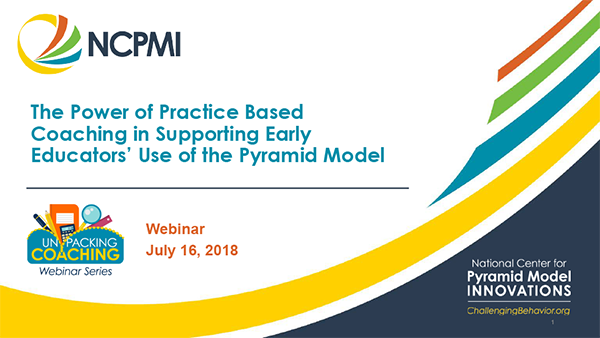
Part of the Unpacking Coaching webinar series, this webinar provides an overview of practice-based coaching (PBC) and how it can be used to support implementation of the Pyramid Model practices. Practice-Based Coaching is briefly introduced and then three panelists who have been involved in coaching related to the Pyramid Model share their experiences.

Practice-Based Coaching (PBC) is an evidence-based coaching approach that supports practitioners to use effective teaching practices to promote positive child outcomes. PBC can be implemented in a variety of settings, including classrooms and center-based programs, family childcare homes, and early intervention and home-based programs. This webinar will outline the components of PBC and describe how to use PBC to coach early interventionists who are working with families in homes. The panelists will focus on using PBC to coach early interventionists to support families in enhancing their child’s social emotional competence. Panelists will share their experiences using PBC to coach early interventionists.

Practice Based Coaching (PBC) can be delivered in a variety of ways to build teachers? capacity to implement Pyramid Model practices in their classroom. In past webinars, we discussed how PBC is delivered individually. In this webinar, we invite a coach with experience using PBC in a group format. Panelists will discuss the benefits, the structure and process, and share teacher perspectives to using this approach.
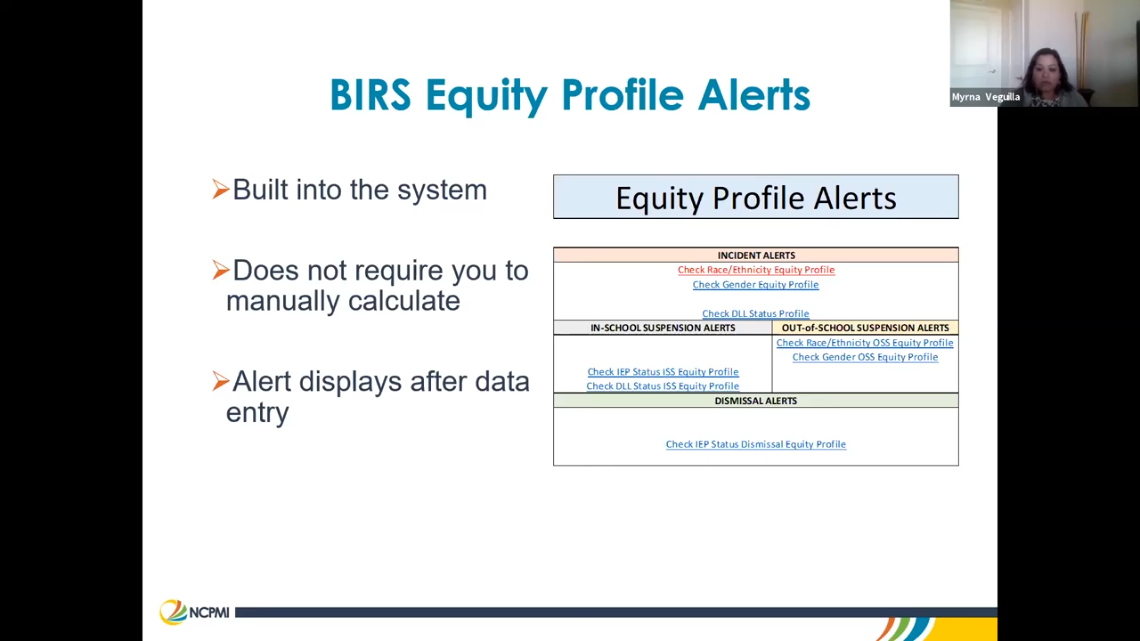
The Behavior Incident Report System (BIRS) Excel spreadsheet has the capacity to alert early childhood programs of possible disproportionality for various groups of children and a particular factor or outcome (i.e., behavior incident frequency, suspension, expulsion). This webinar will discuss the BIRS Excel spreadsheet’s built-in equity alerts, what the measures of disproportionality mean, and how a leadership team will review them. We will also present resources programs can use in their work towards equity.

Pyramid Model Classroom Coach Raquel Lima describes the importance of using TPOT data during the coaching cycle.

Pyramid Model Classroom Coach Raquel Lima describes the importance of using TPOT data during the coaching cycle.

This manual provides a valuable resource that is full of tips and guidance for coaches as they implement practitioner coaching with classroom teachers.
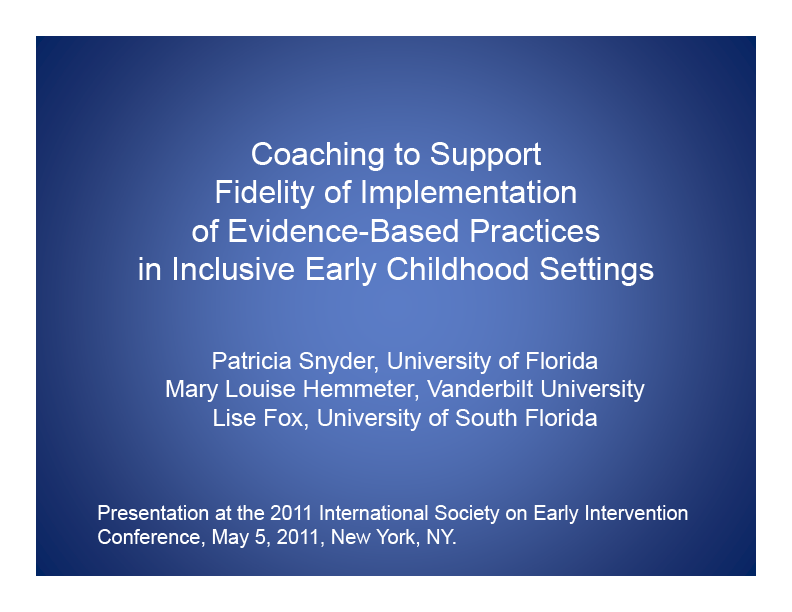
Summary of research studies using practice-based coaching.
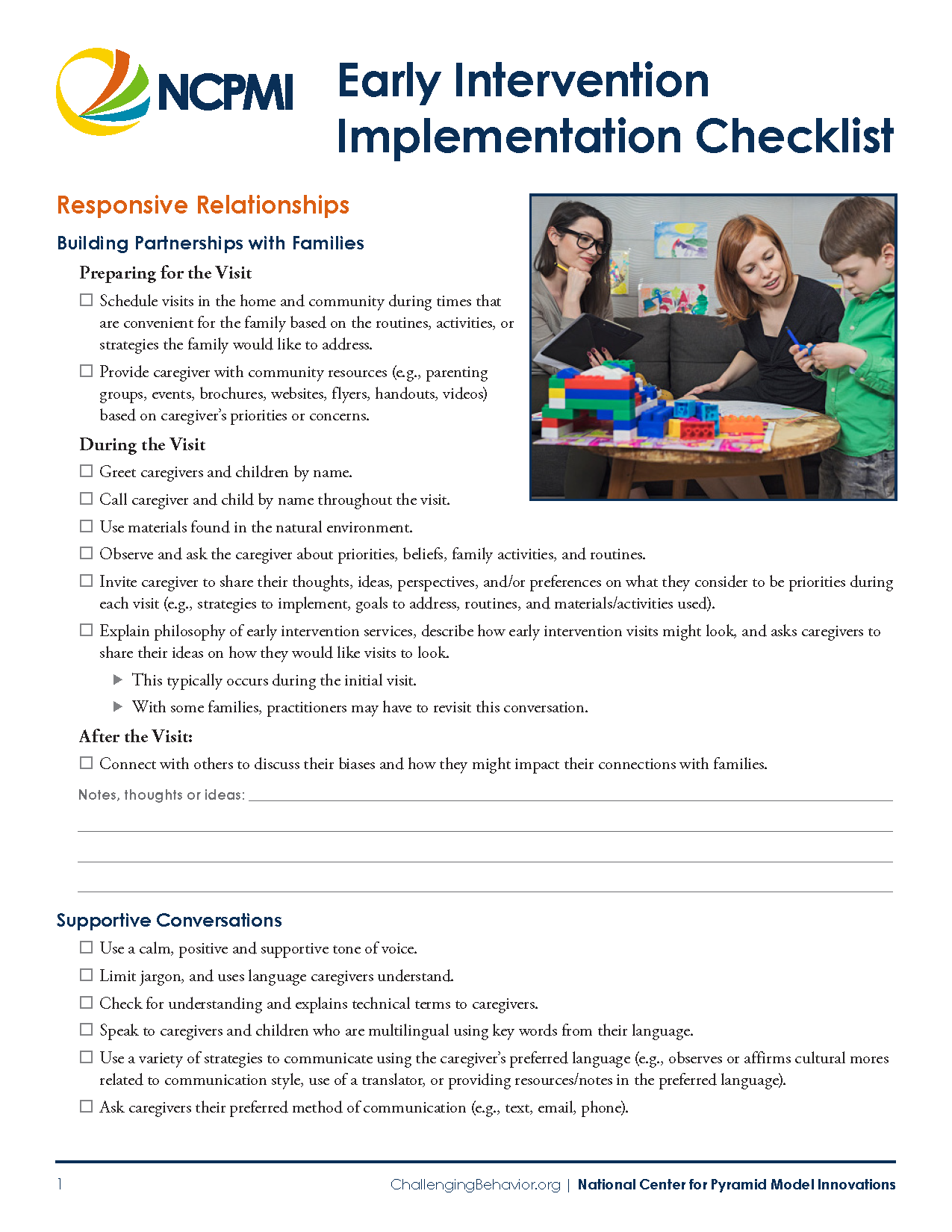
The Early Intervention Implementation Checklist is designed to align with the Early Intervention Pyramid Practices Fidelity Instrument (EIPPFI). Coaches and early interventionists can use this tool to support early interventionists’ self-reflection of the implementation of Pyramid practices, and prepare for shared goals and action planning.
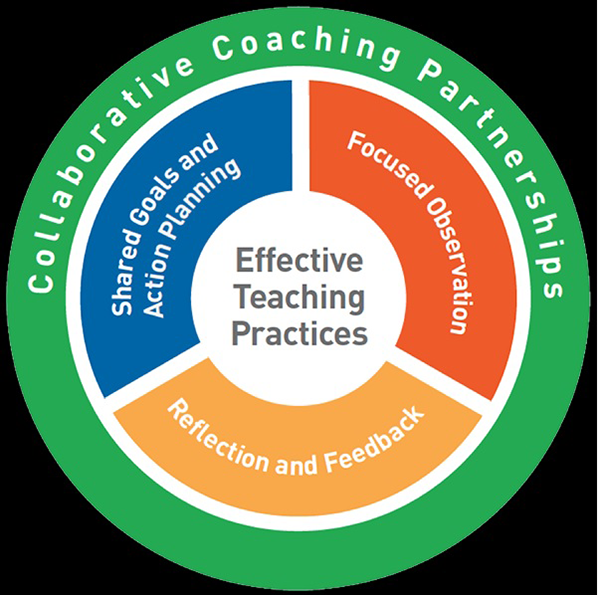
Explore the Learning Lab on Coaching for Practice Change hosted by ECTA to provide information on how coaching can be supported by states and used within programs to improve implementation of evidence-based practices. The four sessions provide presentations, tools, and resources on 1) Innovations for the delivery of coaching; 2) Statewide implementation, systems considerations and examples; 3) Considerations for local and regional programs; and 4) Data Decision-Making and the Implementation of Practice-Based Coaching.
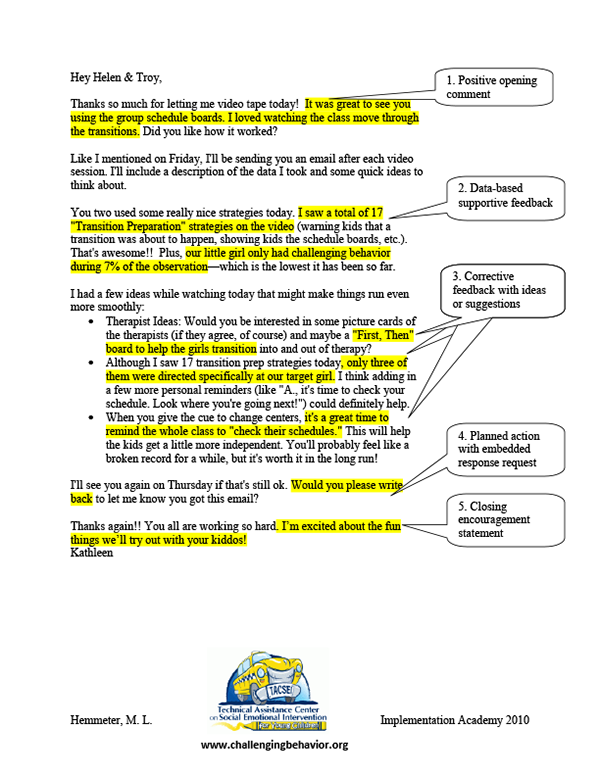
Email feedback is a nice way to remind a teacher about implementation goals, provide feedback on your observation, and summarize next steps. This sample provides you with some ideas for elements to include when providing constructive email feedback.
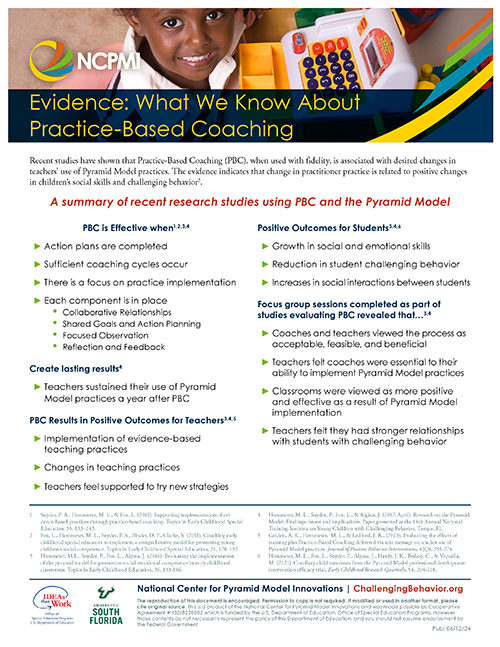
This factsheet provides a summary of recent research studies using PBC and the Pyramid Model.

This Guided Action Plan Package includes action plan templates in a ready-to-use format. The Guided Action Plans At-A-Glance document provides an overview of the intended use of these templates, how this resource situates itself within the PBC model, answers frequently asked questions, and provides a menu of the templates that are available. There are 15 customizable action plans templates and 5 sample action plans that focus on a variety of Pyramid Model practices. A blank action plan template and an individualization planning form.

Provides an overview of the intended use of these templates, how this resource situates itself within the PBC model, answers frequently asked questions, and provides a menu of the templates that are available.
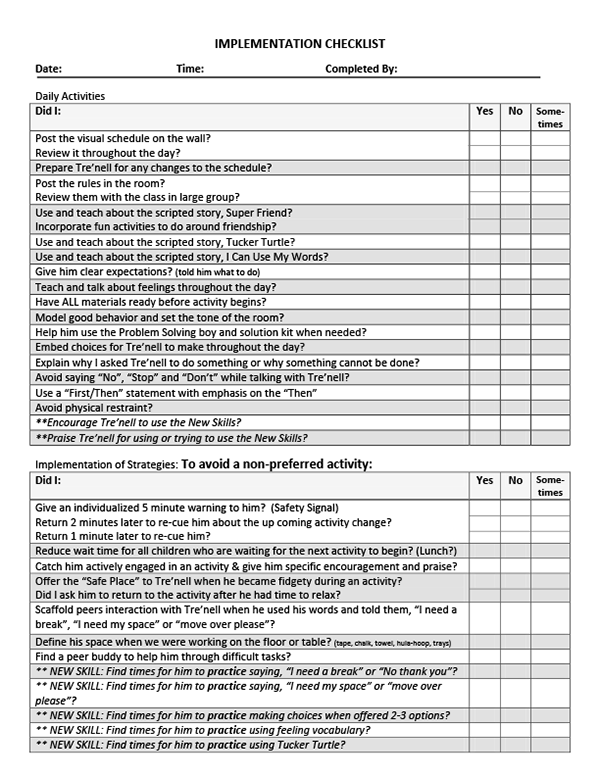
Sample of an implementation checklist for a behavior plan
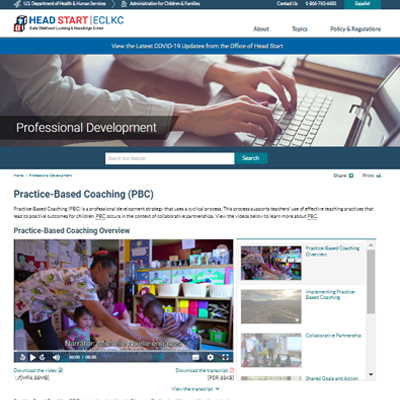
A wealth of resources, videos, and fact sheets related to PBC can be found on the Head Start Early Childhood and Knowledge Learning Center (ECLKC).
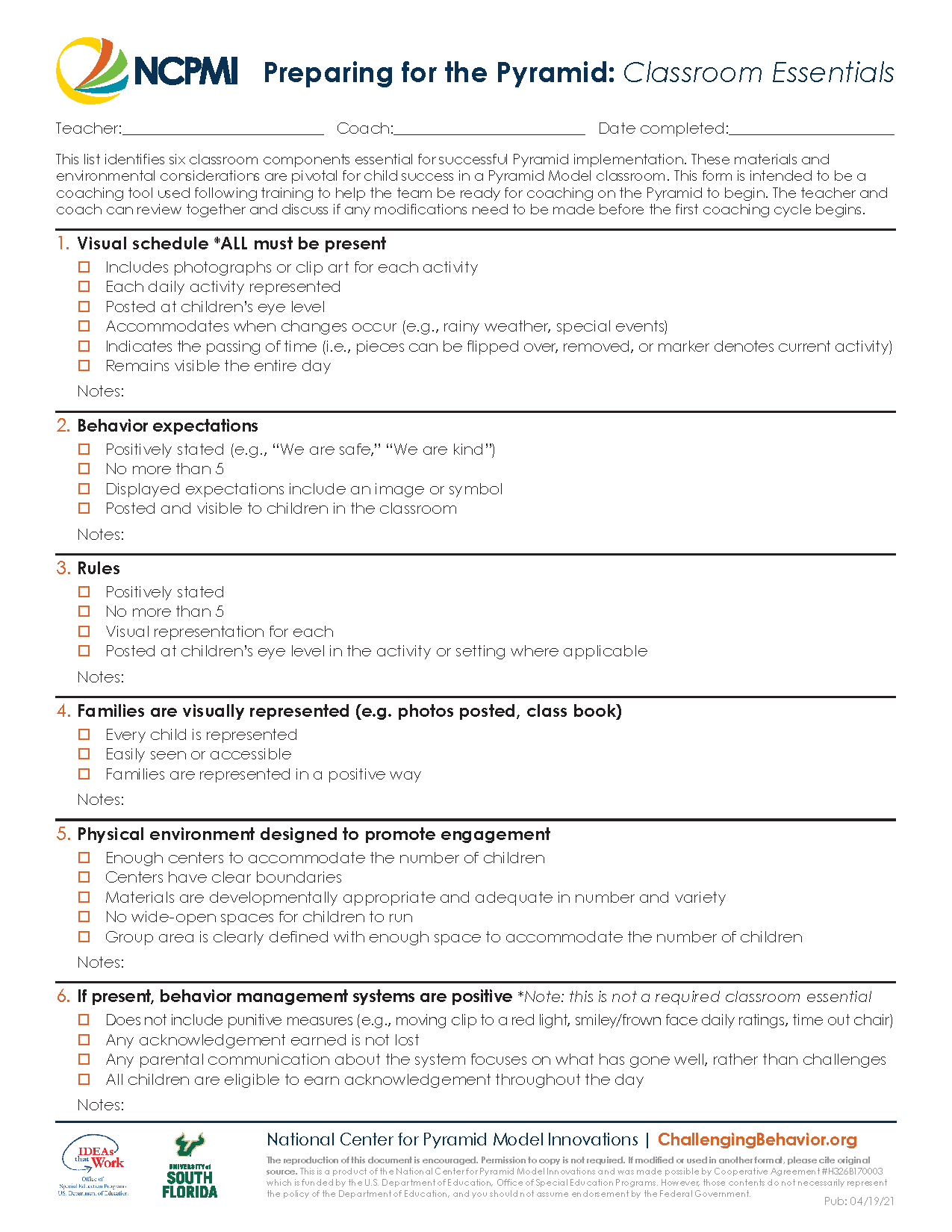
This list identifies five classroom components essential for successful Pyramid implementation. These materials and environmental considerations are pivotal for child success in a Pyramid Model classroom. This form is intended to be a coaching tool used following training to help the team be ready for coaching on the Pyramid to begin. The teacher and coach can review together and discuss if any modifications need to be made before the first coaching cycle begins.
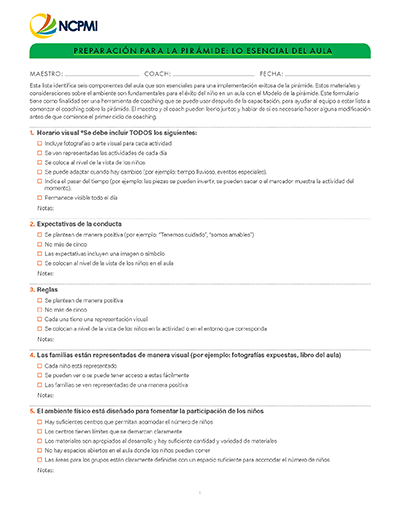
This list identifies five classroom components essential for successful Pyramid implementation. These materials and environmental considerations are pivotal for child success in a Pyramid Model classroom. This form is intended to be a coaching tool used following training to help the team be ready for coaching on the Pyramid to begin. The teacher and coach can review together and discuss if any modifications need to be made before the first coaching cycle begins.
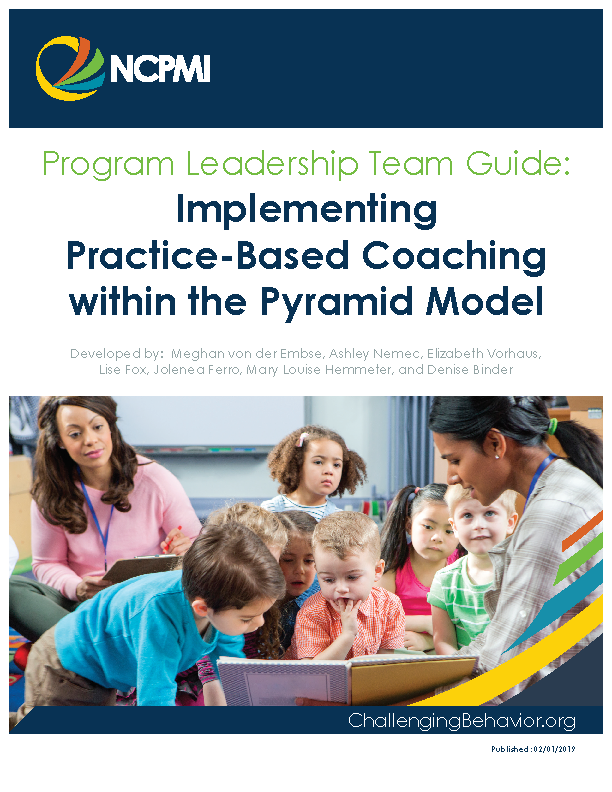
This resource provides Pyramid Model leadership teams with guidance for implementing Practice-Based Coaching within their programs and developing plans for three essential elements of coaching: 1) Getting Ready for Coaching; 2) Enacting Coaching; and 3) Evaluating Coaching.
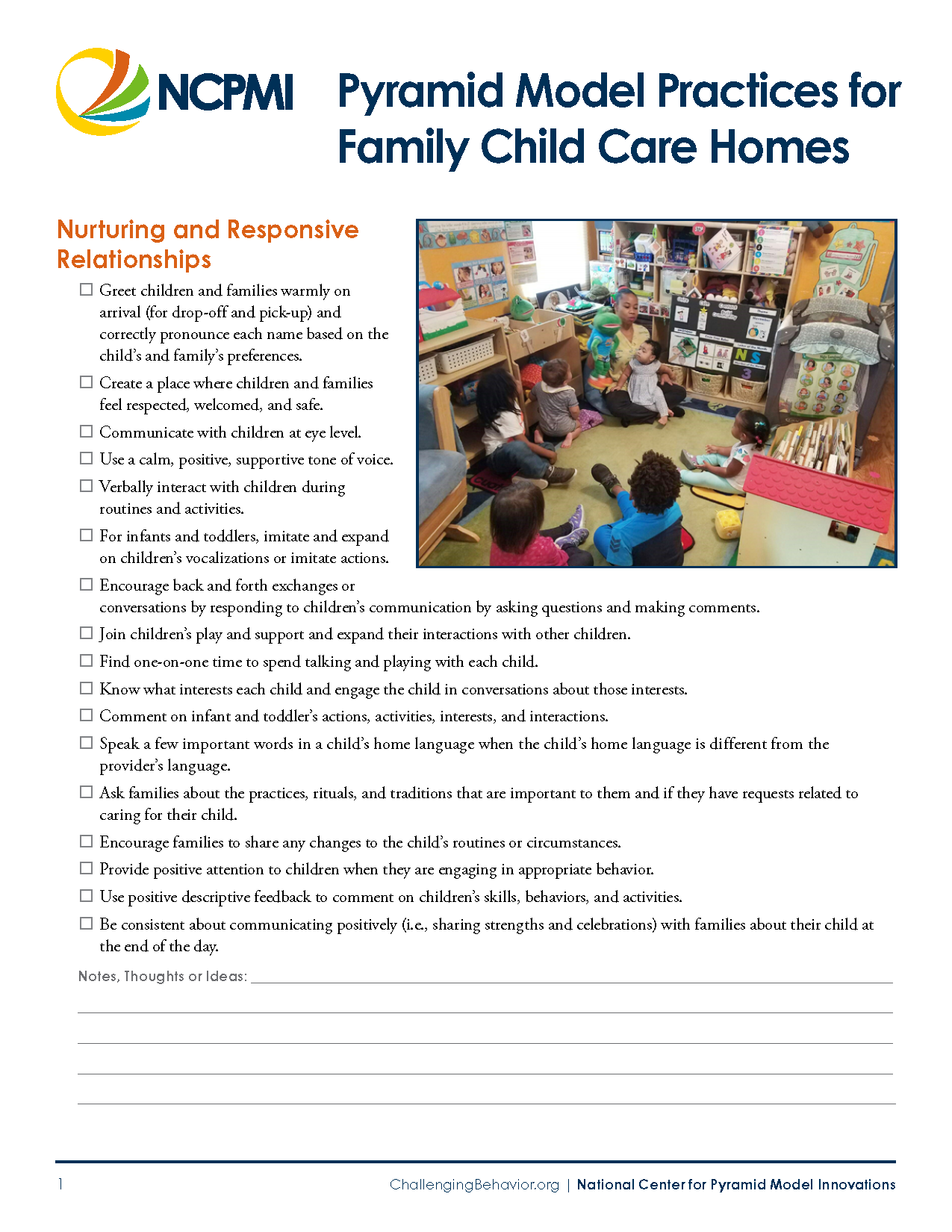
This resource provides family child care home providers with best practices that can be used to support children at each tier of the Pyramid Model.
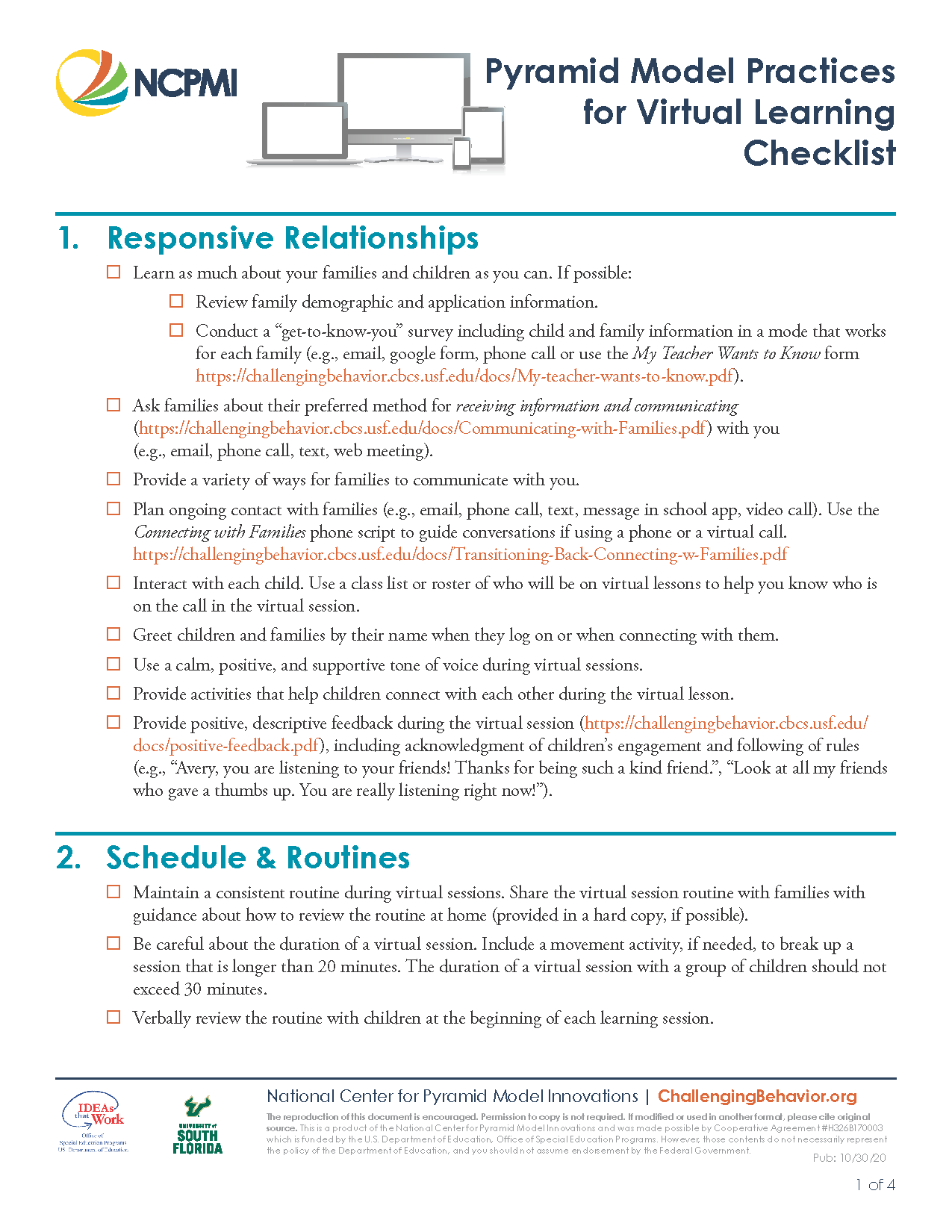
This checklist provides teachers with guidance about using Pyramid Model practices within virtual learning.
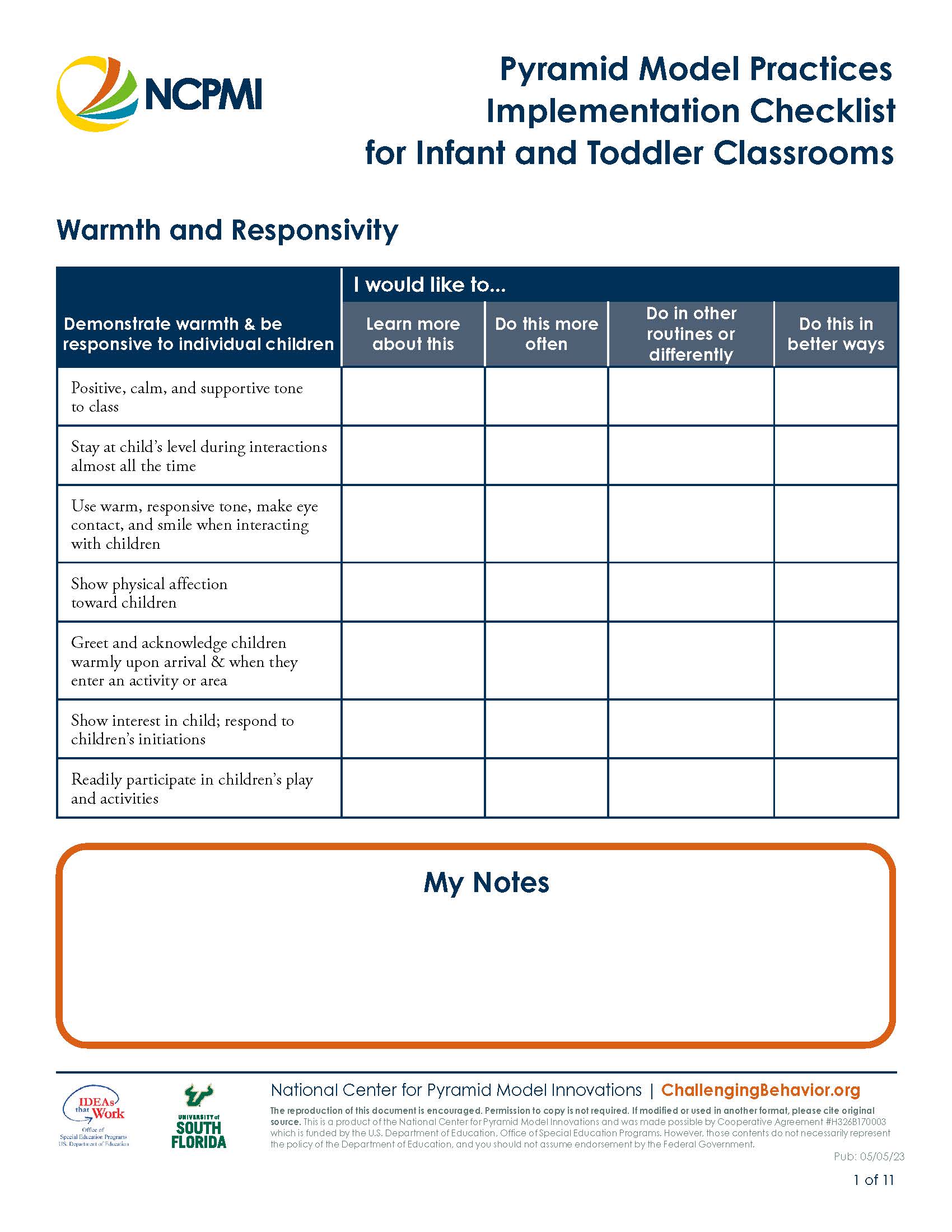
The Pyramid Model Practices Implementation Checklist for Infant and Toddler Classrooms is a tool designed to be used by practitioners to identify training and/or classroom implementation needs in eight areas. The checklist encourages individual self-reflection and discussion between classroom teachers and practitioner coaches.
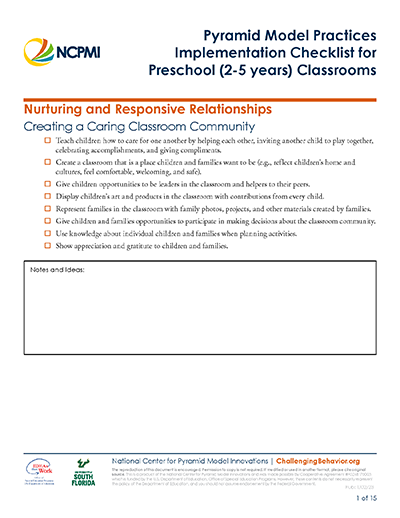
The Pyramid Model Implementation Checklist is a tool designed to be used by practitioners to identify training and/or classroom implementation needs in seven areas: Responsive Relationships; Predictable Daily Schedules; Creating Effective Classroom Routines; Teaching Behavior Expectations across Classroom Routines; Teaching Social and Emotional Skills; Systematic Instructional Strategies; and Function-Based Assessment and Intervention Planning. The checklist encourages individual self-reflection and discussion between classroom teachers and practitioner coaches.
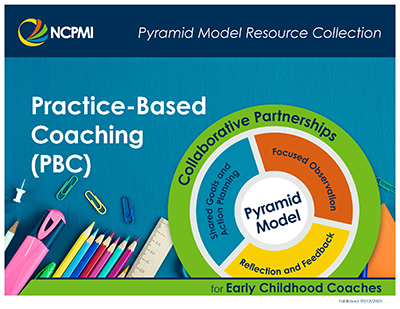
This NCPMI Practice-Based Coaching (PBC) Resource Collection provides coaches with selected tools to support their knowledge and use of PBC in early care and education settings. The resources, predominantly found on the NCPMI website, provide information about PBC as a coaching framework, delivery of PBC to support coaches, specific tools, resources about the PBC coaching cycle, and coaching data tools.
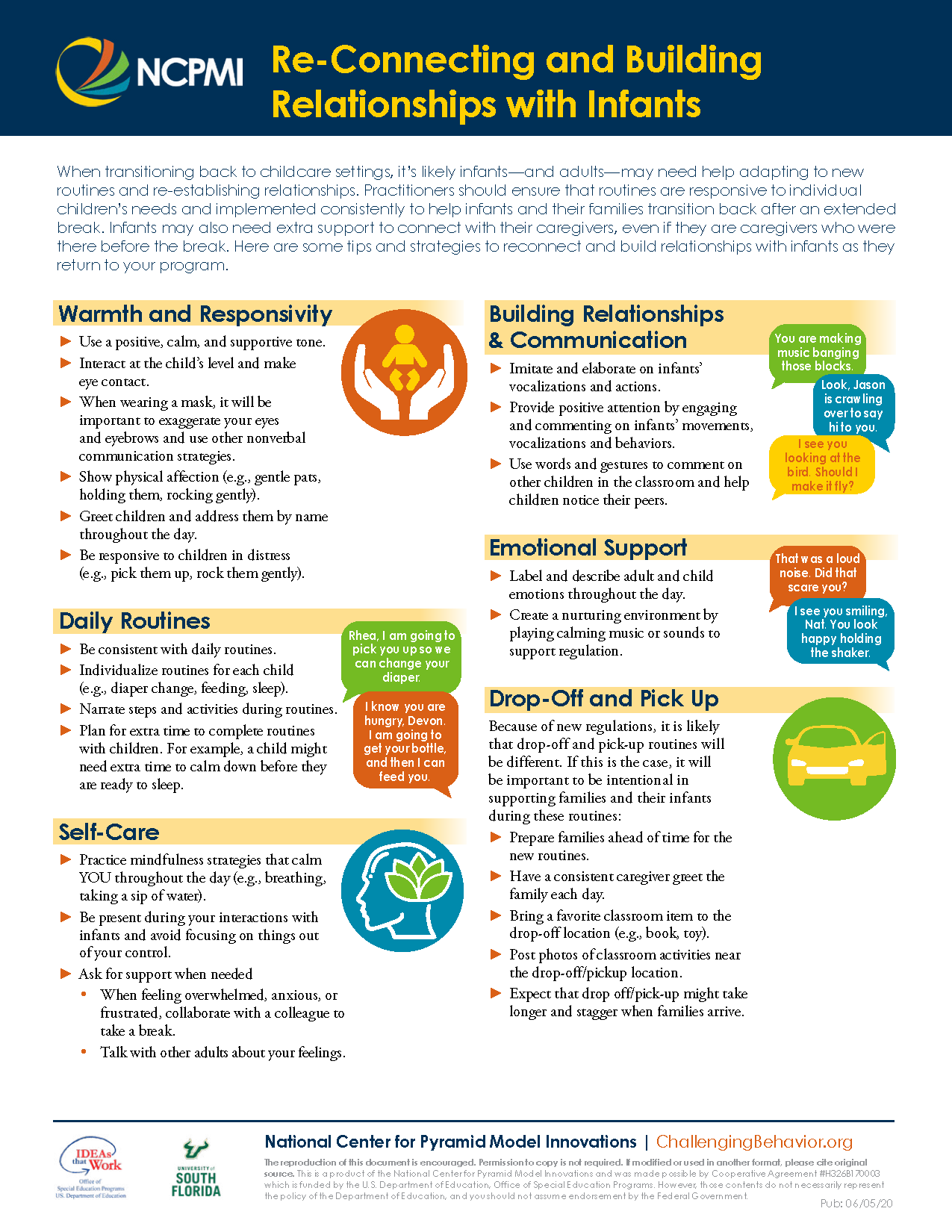
Use this tip sheet to help practitioners of infants and toddlers intentionally plan and think about how to reconnect, help children transition back to the classroom, and support children’s social and emotional development after being away from the program.
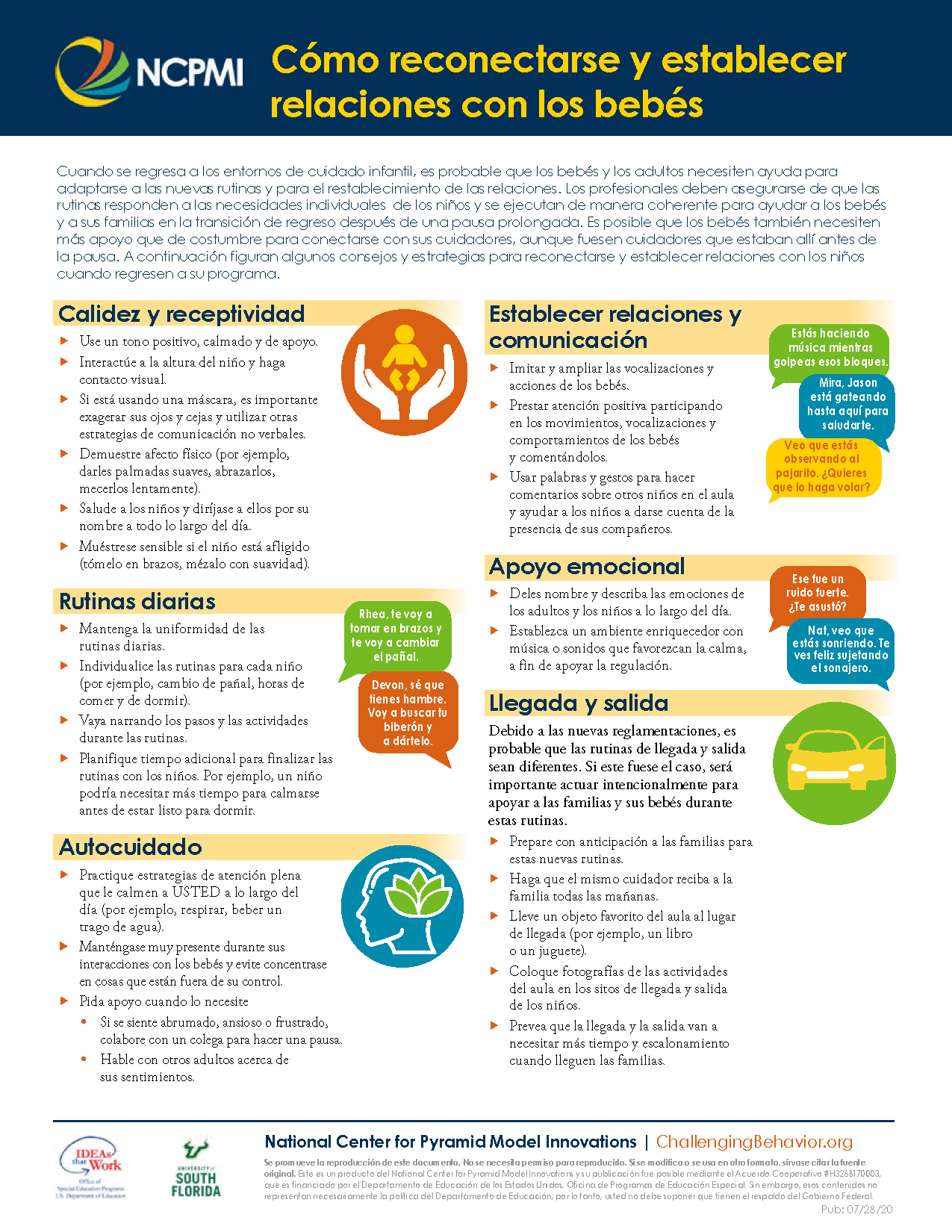
Use this tip sheet to help practitioners of infants and toddlers intentionally plan and think about how to reconnect, help children transition back to the classroom, and support children’s social and emotional development after being away from the program.
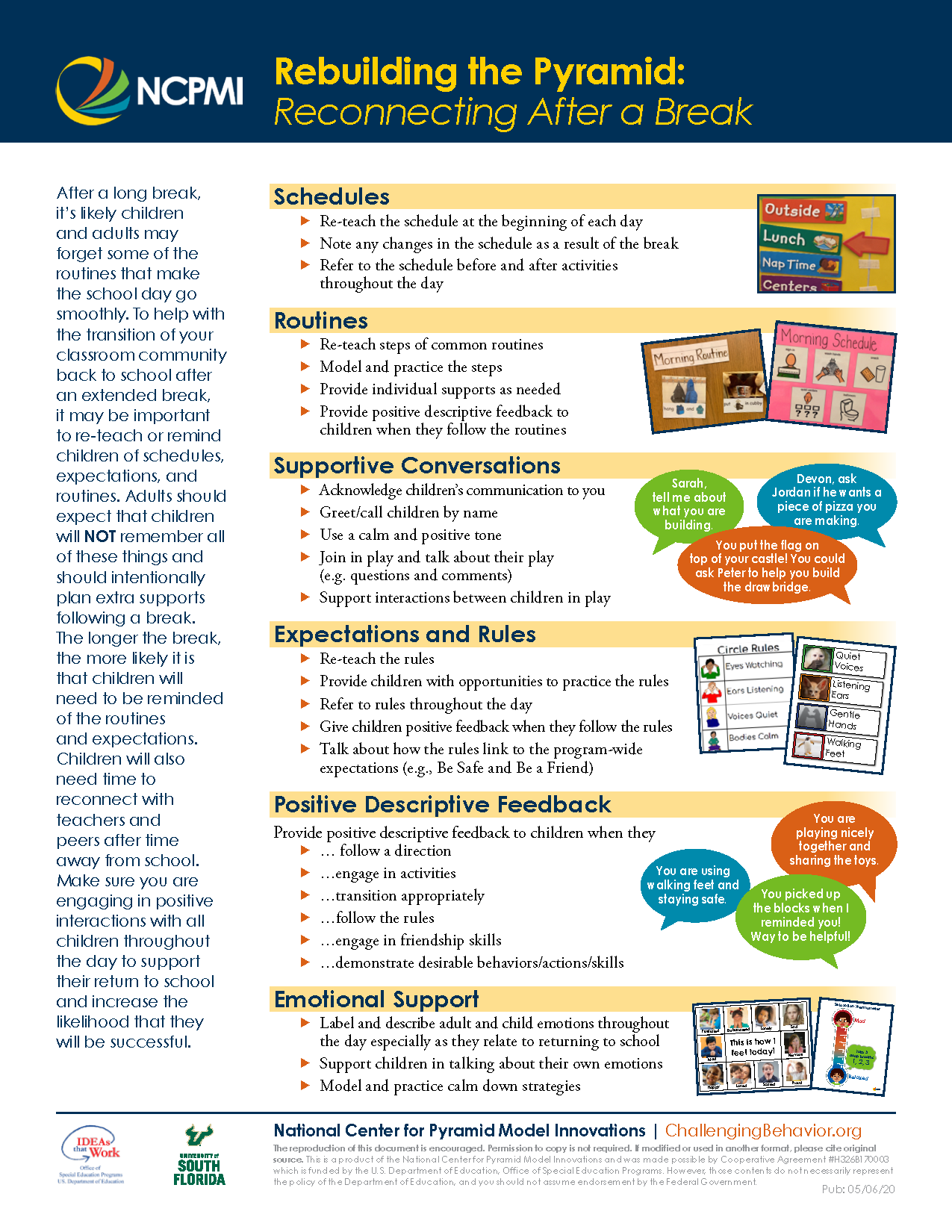
Rebuilding the Pyramid: Reconnecting After a Break is a one page tip sheet to help preschool practitioners intentionally plan and think about how to support children’s use of social and emotional skills that are important to re-teach or remind children after being away from a classroom. Areas to focus on include: schedules and routines, supportive conversations, expectations and rules, positive descriptive feedback and emotional support.
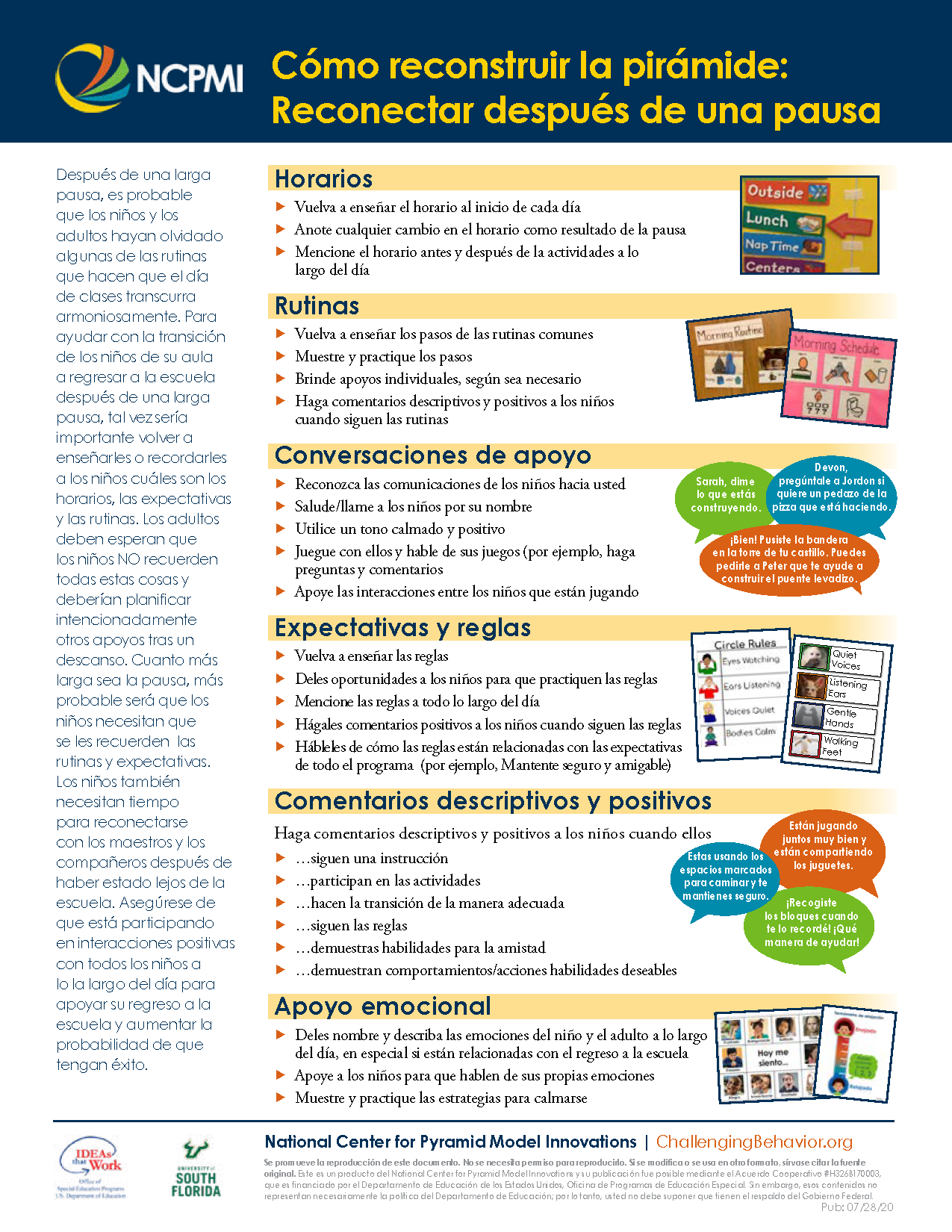
Rebuilding the Pyramid: Reconnecting After a Break is a one page tip sheet to help preschool practitioners intentionally plan and think about how to support children’s use of social and emotional skills that are important to re-teach or remind children after being away from a classroom. Areas to focus on include: schedules and routines, supportive conversations, expectations and rules, positive descriptive feedback and emotional support.
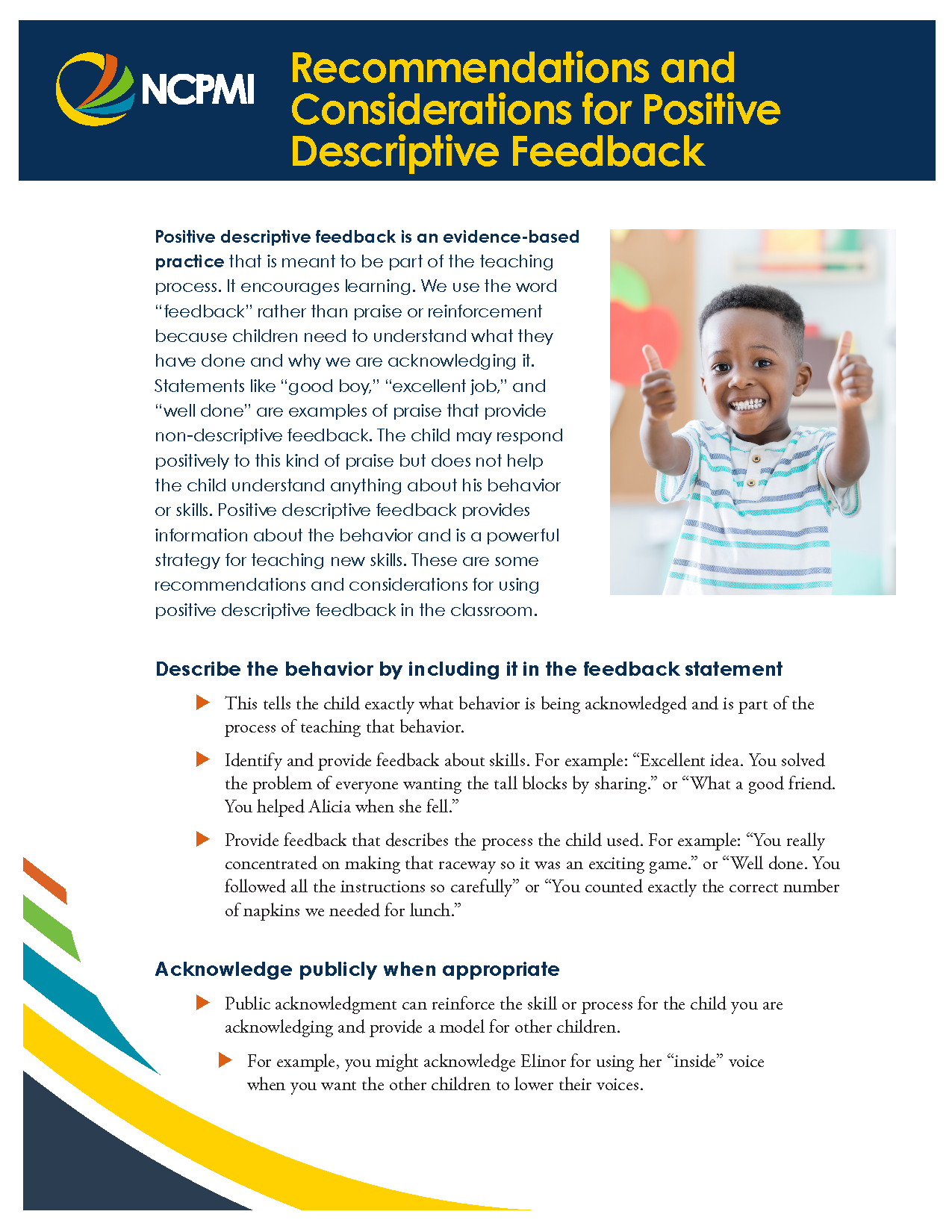
Positive descriptive feedback is a powerful strategy for teaching new skills and maintaining learned skills. By providing information about the child’s behavior as part of the feedback, the teacher helps the child understand what they have done and why it is being acknowledged.
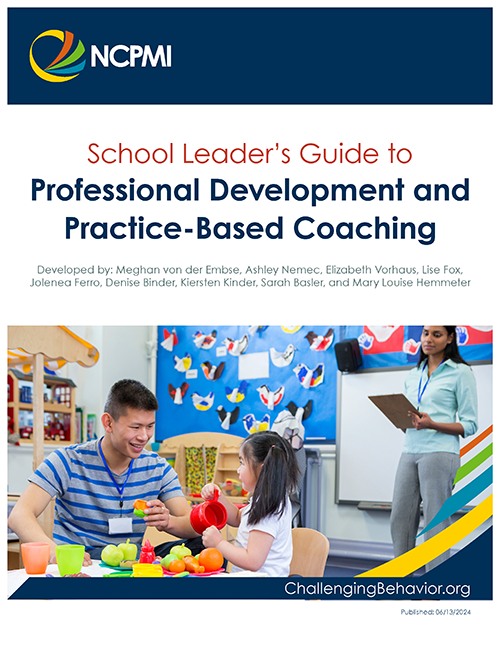
This guide provides school leaders with important considerations as they implement coaching as a component of professional development in their Pyramid Model implementation.

When children engage in behavior that pushes your buttons, it is important to be intentional in how you respond. This resource provides strategies that you might use when a child’s behavior pushes your buttons to help you respond in a way that is supportive of the child.
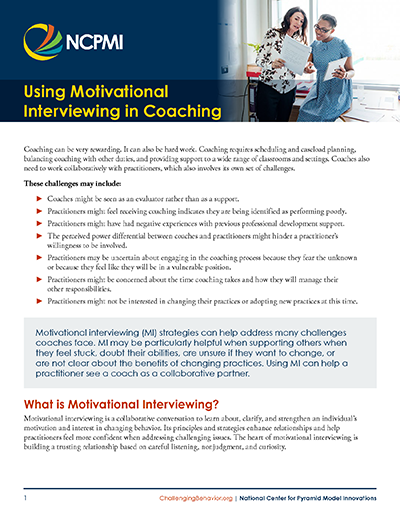
This resource describes Motivational Interviewing and offers strategies that can be used in Pyramid Model coaching.

